#milgram analysis
Text
i wish more people would realise that everytime we see kotoko's "anger" in deep cover we also see her scared at the same time. like
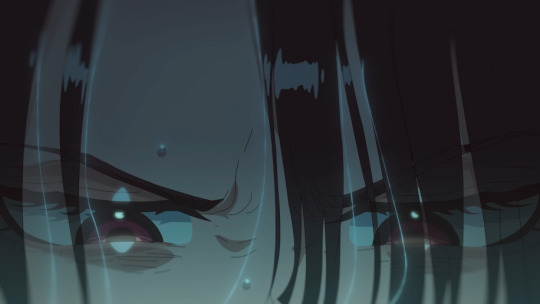

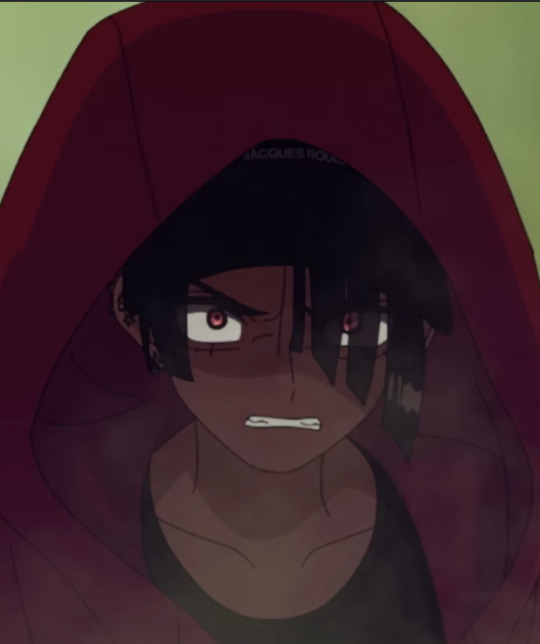


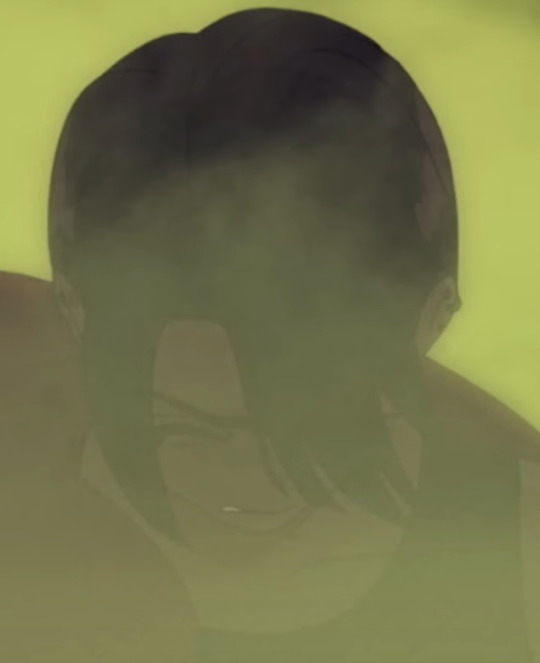

almost like her anger is all she has in order to stop herself from being terrified! almost like her anger is one of her last lines of defense! almost like if you took away her anger you would leave her flayed open and bleeding and lost! like its become one of the only things that have kept her from breaking! or even that she fears her own anger thats become a far bigger part of herself than she can control! hmmmm. HMMMMMMMMM.
#UNDERSTAND MY VISIONS BOY. KOTOKO IS AN ANGRY PERSON YES BUT BELOW THE ANGER LIES A PERSON UNRAVELING AT THE SEAMS AND SCREAMING TO BE SEEN#YOUR HONOUR SHE IS JUST A GIRL AS SAID BY KNIVES#BELOW HER ANGER IS A DEEP COMPLEX TERROR OF WHAT SHE IS AND WHAT SHES BECOME AND WHATS ALREADY HAPPENED OR IS HAPPENING TO HER.#milgram#kotoko yuzuriha#yuzuriha kotoko#milgram analysis#? i guess. a bit. i mostly just wanted to point out how kotoko is scared scared scared scared#i also dont particularly tend to see that first scene in those first images as kotoko being “angry”. but i know some do so whatever
270 notes
·
View notes
Text
Haruka isn’t autistic-coded – he has an intellectual disability (and why that matters)
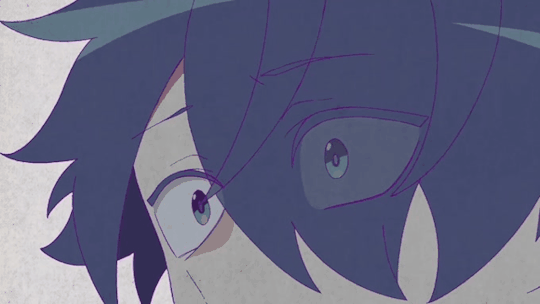
(AO3 Mirror)
A lot of people in the MILGRAM fandom (especially English-speaking MILGRAM fandom) state that Haruka is autistic-coded, as if it’s fact. Most recognize that Haruka is coded as disabled. (If you didn’t recognize that, I hope this post will help to explain why.) However, to state that he is coded as autistic specifically is incorrect. Haruka is coded as intellectually disabled.
Now, there are likely two things that contribute to this issue. One is the invisibility of intellectual disability as a whole, and another is the fact that a lot of this has to do with things that only someone who speaks Japanese would understand (such as complex vs non-complex words in Japanese).
In this post, I plan to lay out what an intellectual disability is and how it differs from neurodivergencies such as autism or ADHD. After that, I want to discuss the way Haruka speaks and uses words, the symbolism in his MVs, and how this lends to him being coded as intellectually disabled. Finally, I want to discuss why this even matters at all. Because, in truth, viewing Haruka as autistic instead of intellectually disabled leaves the viewer misunderstanding his story in a huge way that seems far too common in English-speaking MILGRAM fandom. So, I hope you listen to what I have to say.
What does it mean to be intellectually disabled?
Confusing autism and intellectual disability (henceforth referred to as ID) is not an issue unique to the MILGRAM fandom. They are quite commonly mistaken for each other, in the same way that autism and ADHD are both commonly mistaken for each other. And for the same reason, too – autism and ID are comorbid. This means that, if someone is autistic, they are more likely to have an ID. For this reason, it makes perfect sense to headcanon Haruka as autistic. I headcanon him as autistic, myself, actually. But, in this post, I’m going to be strictly talking about his coding, not headcanons, and he is very specifically coded with an ID.
So, what’s the difference? In the words of the National Institutes of Health, “Whereas ID is associated with general deficits across developmental domains, ASD is in fact defined by the observation that social communication deficits are particularly impairing.” (Source)
To say this in layman’s terms, autism is primarily characterized by difficulties in social communications. Cognitive abilities in autistic individuals vary, just like with allistic individuals, but the defining features are issues with social interaction and nonverbal communication. Autism by itself effects how effectively one communicates, but not intelligence. On the other hand, ID is a limitation on intellectual functioning, just like the name implies. This causes issues in areas like learning, problem-solving, and abstract reasoning.
A lot of people think ID is a synonym for ‘learning disability’. ‘Learning disability’ is an umbrella term that covers things such as dyslexia and dysgraphia. This isn’t the case. For one thing, ID can be a diagnosis on its own. ID is subdivided into syndromic ID, where intellectual deficits are present with other signs and symptoms, and nonsyndromic ID, where ID is, itself, the diagnosis. Examples of syndromic IDs include fragile X syndrome, and Down syndrome. For another, those with learning disabilities tend to have average to above-average intellectual abilities. Their disorder affects their ability to acquire and process information, but they are still able to learn. In contrast, ID affects the ability to learn at all, as well as affecting development and general function.
ID is a debilitating disorder. Many people with an ID cannot live independently, require help with self-care activities, and have limited communicative abilities. Understanding this – particularly, how ID is often a disability that requires a caregiver – is a key point to understanding Haruka as a character. But that’s to be covered later.
Words
The reason why this is a problem in the English fandom specifically is because the main thing tipping off the viewer to Haruka’s ID is the way that he speaks.
‘Weakness’, Haruka’s first-trial song, is written entirely in INCREDIBLY basic, elementary-level kanji – mostly hiragana and katakana. In fact, his first-trial song is misspelled in a lot of official releases of the song (‘Weekness’), which is a good way to get the same effect across. This is not the case across all platforms, though, for whatever reason. He also writes, in his trial 1 interrogation, with only that elementary-level kanji; often only one-word answers. The only complicated characters he knows are usually ones that mean something along the lines of, “I’m a stupid, idiot child,” which can be assumed to be because that’s what he has heard his whole life.
While I’m unsure if it is ENTIRELY in this basic kanji, his second trial song and interrogation is at least mostly written like this, as well. At this point, Muu is teaching him how to read and write (or, that’s what’s implied), but, even with that one-on-one attention, he is still speaking like a child most of the time to the Japanese ear.
When he’s forced to use or listen to words outside of this elementary-level kanji, he gets audibly confused, as well. In the AVIOT earbud collab, he has the voiceline, “Pairing seems to be in progress,” but, if you listen, he says “pairing” like it’s a question. (“Pair-ing?”) He doesn’t know the word is an English loanword that isn’t often used in everyday conversation, so he’s struggling to say it.
He also struggles when speaking to Es in his interrogations. He tries to say, “I will acknowledge any falsehood or silence,” but the words used are very advanced in Japanese. As such, he struggles with it, repeating, “False-hood? Si-lence?” Multiple similar exchanges happen in his interrogations, with Haruka misunderstanding words Es uses, and stuttering over unfamiliar words. The implication is that Haruka struggles with higher vocabulary or unfamiliar words, and with speaking and communication in general. He apologizes multiple times to Es for struggling, saying that he is not intelligent as an explanation multiple times. Additionally, in his second trial investigation, he talks about how he could never do the same things as everyone around him. When Es calls him stupid, he agrees. Es even states, “You really have no learning ability whatsoever.” When, mind you, having delayed or slowed learning is, like, the symptom of intellectual disability. It’s quite blatant. (Why is this not fandom consensus yet, again?)
Moving on from the point of how Haruka uses words, we can talk about other forms of word-based MILGRAM media. For example: when introducing himself, he says he thinks he’s 17, which implies that he isn’t actually sure. Additionally, there is lots of evidence for his intellectual disability in his interrogation questions:
He considers it impossible to learn another language
His dream is to ‘live normally’
He states he disappointed his father (not inherently an ID-related thing, but also, makes sense with his coding in mind)
Many answers imply that he’s been unable to live his own life, and he doesn’t really have any aspirations outside of being given attention
Finally, we have the lyrics to his songs. Again, on top of being written in very basic kanji, we have lines like the following, which include repeated themes of needing a caregiver (being ‘hopeless’ by himself), not being able to do what others can do, hating how he was born, and struggling to function. (I have bolded examples that I think are especially apt.)
“Why was I born like this? Why does it hurt so much?” / “Why was I born to be me? Why does it hurt so much?”
“Instead you kept calling me “hopeless” / You never called me by my name / You were always comparing me to someone else”
“If I tried and couldn’t say it, you would get angry at me and say “You’re hopeless”” / “When I tried to understand it, you’ll make that disappointed face again”
“I just wanted to be your good boy” (what did the MILGRAM team want us to think when they included this line? likely that he’s childish or ‘hasn’t grown up’, right?)
“Mommy, look / I’ve done great” (calling her ‘mommy’ instead of ‘mom’ – again, ask what the MILGRAM team wants us to think when they included this)
“If only I could do what anyone else could do”
“It’s enough, I am a “disappointment””
“My life started in a wrong spot”
With regards to his relationship with Muu, he doesn’t understand why Muu using him would be a bad thing, or how she is manipulating him. People with ID tend to have poor judgment, and Haruka not being able to tell the difference and not caring about the difference between negative and positive attention shows this (although his trauma definitely also plays a role).
Finally, we have the trial song titles.
We’ve already discussed how “Weakness” is sometimes alternatively misspelled as “Weekness”, and that is because the title in Japanese is, arguably, misspelled, too. The Japanese title is a play on the phrase jakuniku kyoushoku, which is equivalent to the English phrase, “Survival of the fittest.” More directly, it translates to, “The weak are meat, the strong do eat.” The character for “strong” (kyou) is replaced by “together” (also kyou) – with the implication being that Haruka forgot which version of the word was correct for this situation. This also works to create a pun, of sorts, as this makes the title more like, “The weak are meat, communal eating”, creating an emphasis on the fact that there are more people eating than there are ‘weak people’. There are differing ways to interpret this pun, but one way is to view it as a statement on Haruka’s status as a minority, oppressed (‘eaten’) by the majority.
On the other hand, we have All-Knowing and All-Agony. In Japanese, this song title is Zenchi Zennou, which can be translated as “Omniscient and Omnipotent”, used to describe the Christian God. Once again, we have what we can assume is Haruka misspelling the title, creating a pun. One that is much more on the nose, as the character for “ability” (nou) is replaced with the character for “worry, distress, pain” (also nou).
It seems that the reason why Haruka uses new complicated words (aside from the words meaning “idiot” and the like) in All-Knowing and All-Agony is because Muu is teaching him. It features the more complicated “食” (shoku; food), when we know from Haruka’s 2023 birthday portal that Muu is bringing him meals. It also prominently features Muu’s name, 夢 (yume; dream), which is more complicated, as well.
Imagery
Now, we get on to the non-verbal, more visually-based evidence for Haruka’s ID. Be prepared for a lot more images!
Going back to Muu teaching Haruka how to write: it’s not just clear in his usage of kanji, but also how he writes. Comparing his handwriting, it becomes much easier to read after Trial 2’s start, and his writing is soft and bubbly; much like a teen girl’s writing might be.
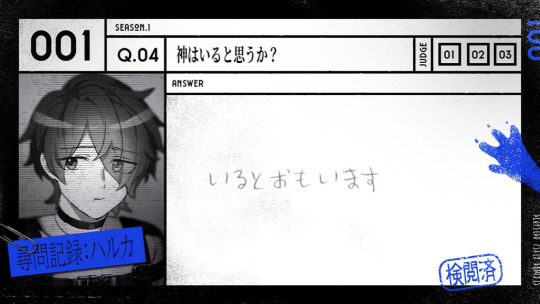

All of these improvements are able to be linked back to Muu (both his style of writing and in the more complicated words that he knows), who we know is looking after him. Considering this, it’s pretty clear why he sees her like a maternal figure.
One of the Minigram comics shows the prisoners eating curry udon together. Of the four shown (Amane, Haruka, Shidou and Mahiru), Amane and Haruka are the only two who make messes out of their clothes. Since the other two characters in the comic have active roles, and Haruka has the most passive one, Haruka’s inclusion can be assumed to be because he is the only prisoner aside from the child, Amane, who would make a mess while eating.

Childish themes and imagery are seen scattered throughout his MV, as well, especially his first one. He draws with the skill level of a child, which is a very prevalent motif, and he is shown to sleep with a plushie.
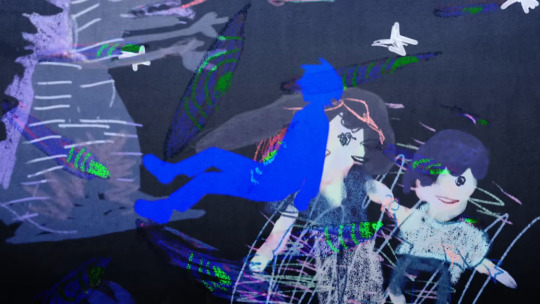
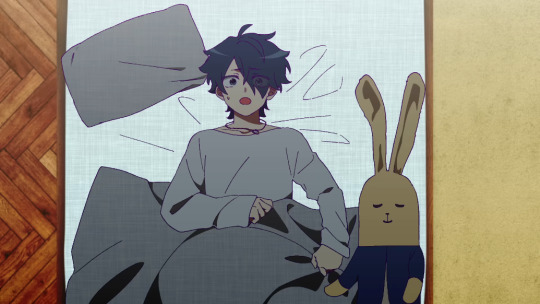
Additionally, he seems to have trouble putting on his clothes. He wears two entirely different socks – not just different colors, but also two different lengths. His pant legs are also two different lengths when he tries to roll them up in his Trial 2 art, and he seems to exclusively wear slip-on shoes up until he befriends Muu (where we can presume that she begins helping him, and even then, they're not done properly).
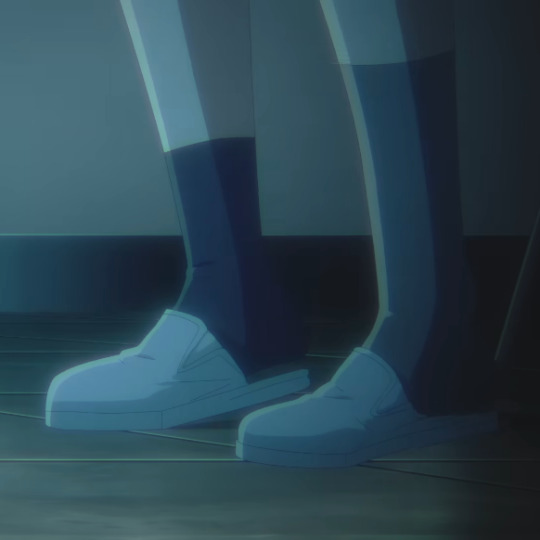

There are various visual parallels drawn between himself as a child and himself as he is now (for example, the way that his clothes are a mix of his current shirt and the vest he wore as a child in All-Knowing and All-Agony), and he often compares himself to a child wanting praise.

Even the violent acts that Haruka is shown committing are also a sign of an ID. People with IDs tend to have meltdowns, and devolve into fits of violence. The reasons for these meltdowns vary depending on the person, but reasons can include anger / frustration (especially in reaction to not being able to communicate well), sensory overload, and confusion.
You may note that Haruka’s mother reacts the exact wrong way for dealing with these meltdowns. When trying to help someone experiencing a meltdown, especially a violent meltdown, the last thing you want to do is appear frightened. The number one piece of advice everyone gives for helping someone experiencing a meltdown is to remain calm. It’s also not advised to leave the person alone, either, because that sends the message, “I want to avoid you when you feel this way.” (Which I suppose, for a neglectful mother like Haruka’s, would be technically accurate, but still not at all helpful.)
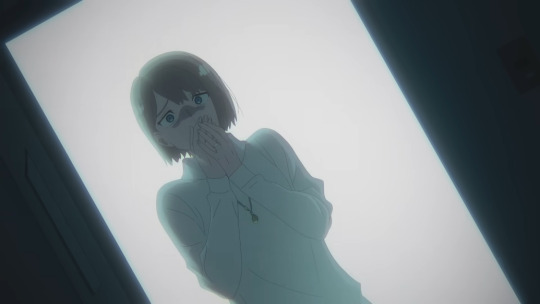
It only makes sense that Haruka’s tantrums continue to get worse and worse.
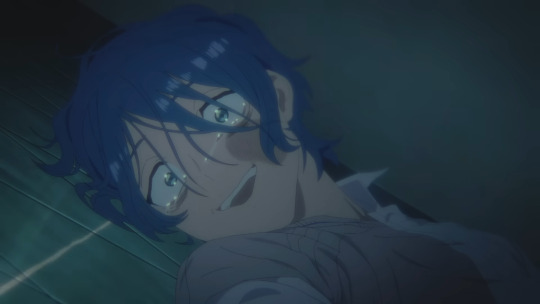
But after the meltdowns fade, he seems to not understand what he’s done. He’s shown experiencing fear and confusion after he hurts something, even shown as his child self at one point. A major part of IDs is being unable to connect actions to consequences.
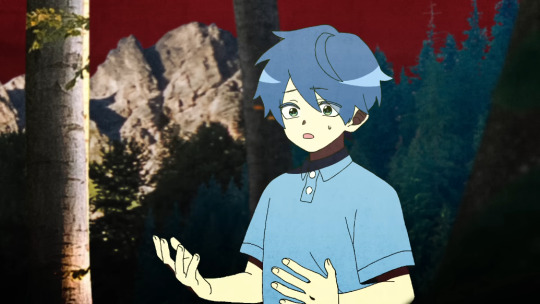


Finally, we go onto his body language. Frankly, I considered putting, “Imagine this as a real person doing these things and not an anime boy, and you’ll see my point.” Which is true. But I decided to go a little more in depth.
Swaying is heavily associated with people with IDs. This is, in part, because people with IDs have reduced postural balance, and general body balance. Because of that lack of postural balance, people with IDs tend to slump quite heavily, as well. Both of these traits are shown very obviously with Haruka, in All-Knowing and All-Agony.

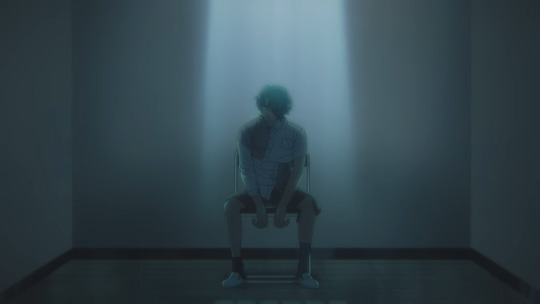
In the same MV, he’s also shown biting his nails. Like autistic people, people with IDs stim, and this could also be a version of hand mouthing (repetitive contact between the hands and the mouth / tongue), which is also heavily associated with / often seen in intellectually disabled people. He's also shown doing this in promo art.
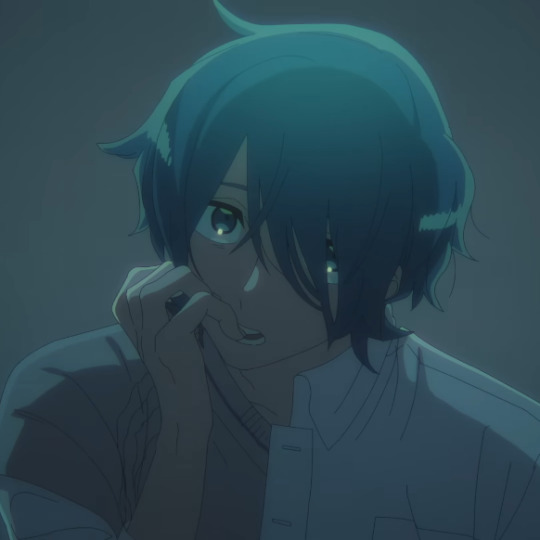
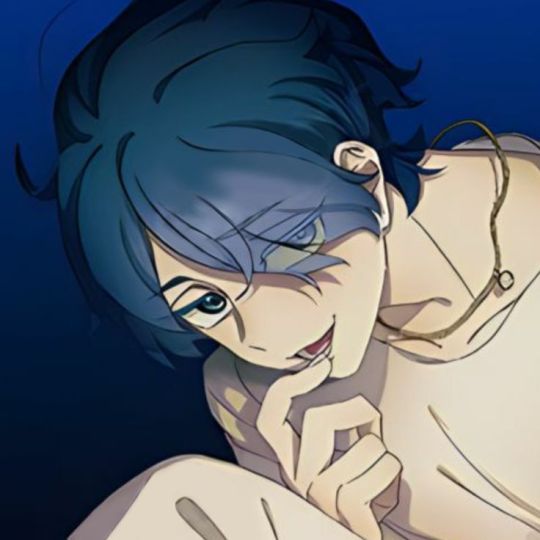
So, why does this matter?
Haruka being intellectually disabled is a huge part of his story, and, when taking it into consideration, it changes how one views his story a lot.
Haruka being treated better as a child makes more sense with this framework. He wants to return to when he was a child because his level of intellect then was seen as more ‘normal’. There wasn’t as much obviously ‘wrong’ with him yet. Children are expected to be a little slow, but it’s when they remain that way that many parents begin to become concerned. He yearns for when his mother didn’t know he was disabled, and when she treated him better for that reason.
Haruka being severely neglected / abused by his mother would be awful, no matter what, but him being intellectually disabled makes it so much worse. He needs attention and care from his caregivers even more so than the average child does, because he has trouble even functioning on the day-to-day without help. This is why he thrives under Muu’s care; she is meeting his support needs. Likely not perfectly (she’s just a teenage girl, and she is almost certainly not trained or educated in this regard), but even with the amount of support that she is able to give, Haruka is thriving. He’s more confident, he’s learning how to write, and he’s eating more consistently.
Without that care, he struggles so severely that he melts down regularly, going into fits of violence over the fact that his support needs aren’t being met (on top of all of the other emotional baggage that comes with any child being neglected by their parent). Haruka’s mother continued to ignore these cries for attention, for help, for care… Until it went too far.
The way that Haruka’s story is viewed changes drastically with this information. If Haruka was autistic, it would affect very few of the things that I listed. So much of Haruka's story hinges on specifically his intelligence level, not how he socializes. And do you have any idea how many people I’ve seen say, “He’s a neurodivergent with a shitty mom, but so am I, and I didn’t kill anyone about it”? No. If you are not intellectually disabled, you do not get to compare your experiences as if they are equal. If you don’t have an ID, your experiences cannot be compared in this way.
Haruka has a debilitating disability that requires support which he was not getting. He was experiencing ableist abuse at the hands of his mother, and he didn’t know how to handle it. All of his violence happened during his meltdowns, and his disability makes it harder for him to connect his actions to the consequences, or find alternate ways to solve his problems – this is all extremely important information and context when you’re discussing whether or not his crime is forgivable.
If you still don’t forgive him, that’s alright. But to neglect this aspect of his character is, to be frank, baffling, if you’re trying to participate in the spirit of the series and understand everyone’s crime to the fullest extent. And to make jokes, comparing your own experiences to Haruka’s, since you assume him to be neurodivergent and nothing else, does a huge disservice to his story! And, when it’s done to demean him? It honestly comes off a slight bit ableist.
So, I’d like everyone to keep this information in mind moving forward. Don’t infantilize Haruka for his disability. But do consider this information in your analysis posts, your discussions, and so on. I’d like to see this become common knowledge in the MILGRAM fandom, especially since the idea of him being specifically autistic-coded is so widespread by this point.
Thank you!

#haruka sakurai#milgram#the milgram project#milgram meta#milgram analysis#intellectual disability#haruka#sakurai haruka#azure does a thing
338 notes
·
View notes
Text
I think my most meta milgram theory is that all the prisoners relate to social issues in Japan (this was brought up by my friend but they don't have tumblr so I'm gonna post it here)
Haruka- ableism, specifically against learning disabilities. Haruka's story is all about how he was born "wrong" and how his mother didn't want him
Yuno- the abortion debate
Fuuta- online harassment and cancel culture
Muu- bullying, and how in social structures someone always has to push someone else down to be on top (the whole hourglass metaphor)
Shidou- curroption in the organ donation system, and how brain death is viewed in Japan
Mahiru- societal expectations of women, and the pressure to marry
Kazui- okay so since his crime is vague rn, either A. Cheating or if gay kazui theory is correct B. Lgbtq issues, could also be japan and it's issues with intimacy and how his wife felt unloved but he didn't realize
Amane- Japan and its history with cults
Mikoto- ableism against the mentally ill, and the "just endure it" view of mental illness in Japan which makes alot of people reluctant to reach for mental health help. It's probably why Mikoto seems to not realize he had DID or OSDD
Kotoko- curroption in the legal system, and how crime against women and children are often ignored by the police
#milgram#milgram analysis#milgram theory#i think this is meta#yuno kashiki#shidou kirisaki#mahiru shiina#kotoko yuzuriha#haruka sakurai#kazui mukuhara#fuuta kajiyama#muu kusunoki#amane momose#mikoto kayano
1K notes
·
View notes
Text
haruka and what each animal on his case represents, an analysis
before we begin, general CW for the issues haruka's story deals with (neglect, child abuse, animal death, etc).
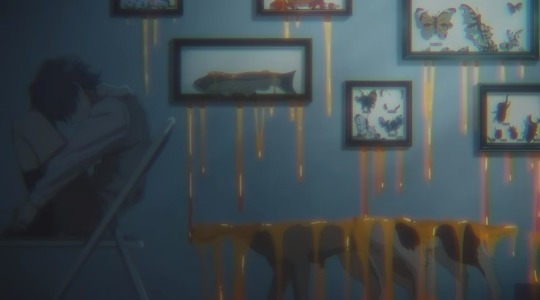
Throughout the MVs, animals play an important role in Haruka's story. I think each of these represents a part of Haruka, both how he perceives himself and how he wants to be perceived. Even if Haruka presumably has numerous animal victims, the ones most emphasized are dogs, fish, and rabbits.
1. RABBITS
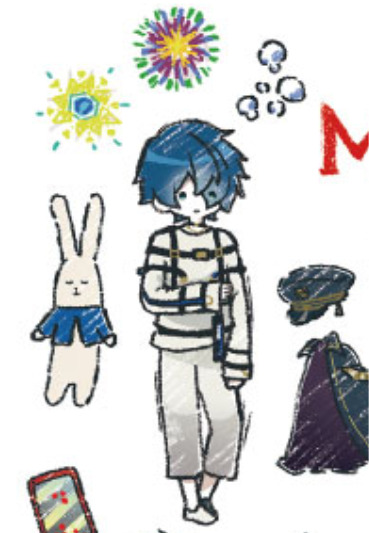
Haruka is seen on many occasions with his bunny plush. It’s so important that it appears not only in Weakness and Undercover but also in graffart’s collab, where each item is importan on the character's story in one way or another (like mahiru and the mantis). I see it as a toy from his childhood that he’s very attached to.
The fact that it’s specifically a rabbit is interesting to me, as the rabbit is a prey. If we go to the unique point of view of Japanese culture, rabbits are also quite related to the moon. The lunar cycles are also an important symbol in weakness, showing white, blue and finally red moons over a red sky. The origin of the relationship between rabbits and the moon is debated between admiration as they are perceived as objects of fertility and health because of their reproduction, or a legend that spread from India:
"a rabbit can't tolerate seeing people die and jumps into the fire to become food, then Indra rewards him for his sacrifice and takes him to the moon."
The theme of self sacrifice and the ultimate reward one receives for it is reinforced by Taoism, where the hare, like the moon, dies to be reborn and represents immortality. More popularly, rabbits are also associated with good fortune. It being white also points to innocence, and in turn to the pursuit of something that upon attainment brings discovery, an idea popularized by Alice in Wonderland. Even if it's more seen as a weak and tender animal, it has also been culturally represented as cruel and capable of aggression, closer to what Haruka is than the role of merely a prey. Haruka wants to be seen as weak prey that the strong hunt, to be pitied and loved for it. To be perceived as someone to be protected, as he cannot defend himself, but this is contradicted by his own actions both in weakness and throughout milgram. The prey becomes the predator and gives way to the next animal;
2. DOGS

The dog is universally a symbol of loyalty and the effort it takes to form a training bond between a wild animal and a human. Dogs are seen accompanying men and being obedient to women.
Dogs are perceived as creatures that love unconditionally and are capable of giving everything to protect those they love.

In terms of personality and behavior, they are the closest animals to Haruka, who accepts and actively seeks to be guided and to be faithful for someone, to be used to feel useful and not abandoned.
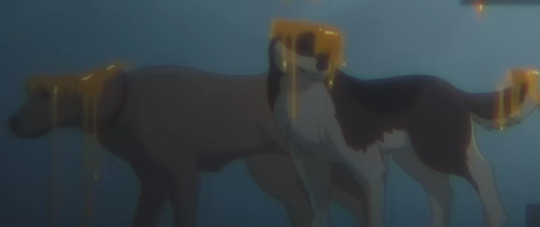
Even if they are domestic, the dogs whose breeds are distinguishable are large dogs, considered to be hunting dogs. Haruka being represented as a dog also creates a parallel with kotoko, who is represented by a wolf.
Haruka being represented as a dog also creates a parallel with kotoko, who is represented by a wolf. Dogs are the friendlier, "clean" version of wolves, domesticated to be obedient, while wolves maintain a certain solitary air of independence and savagery.
However, whenever a dog is featured on screen it is accompanied by loud instrumentals and rather graphic visuals. In Weakness, child Haruka accepts and expresses affection towards the animal, who apparently is suddenly injured and runs away from him into a forest, where he is disoriented and confused. Haruka follows its footsteps and ends up seeing his hands in horror, realizing that he's the cause of its injury.
The perspective of present Haruka isn't so different, who now attacks it, destroying it until the only remains are the necklace it was wearing, ultramarine liquid and eyes, which I consider represent the opinions of others and looks that judge him.
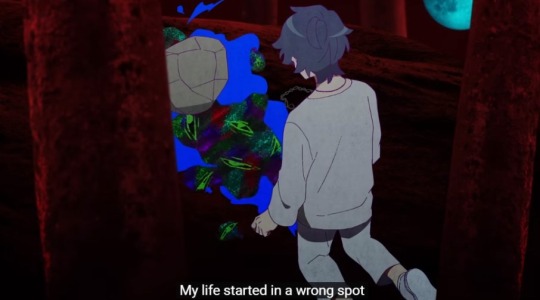
I think the fact that this dog bleeds the same color as Haruka's is a not-so-hidden hint at the fact that, in a way, Haruka is ending up with a part of himself (this time a bit smaller, not being human yet) to escape people's judgments.
There are also many sayings that by mistreating someone, "you are treating them like a dog", like an animal, something inferior, but that still sticks to what the human wants and believing all their words.
In AKAA, we see that instead of being a mix of at least two dogs, they're now separate entities and different breeds that dissolve as Haruka sings about being reborn. Again, dogs often appear in stories as spirit guides, helping humans enter and exit the realm of the dead safely, representing a middle ground between life and death. Dogs are followers of their owners, not leaders, and no matter how close a bond they form with humans, they are rarely recognized as equals to us.
3. FISH
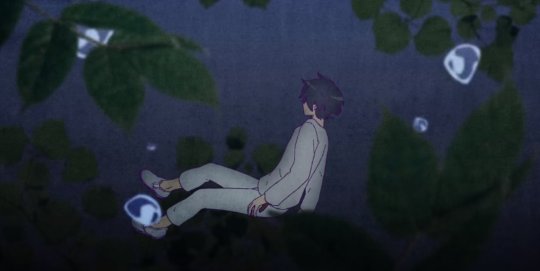
Most of the similarities between Haruka and fish are presented visually, with Haruka being a passive spectator of his own life, observing others from behind something akin to a glass wall that separates him from normal people. He's constantly surrounded by water drowning, and in one scene is even presented at a fish-eye angle, being watched by his mother.
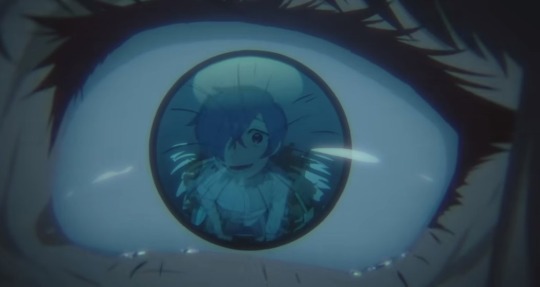
In AKAA we can see two specific species of fish.

Yellow bobfish: they're very complicated fish to keep in aquariums because they release toxins when stressed and are naturally solitary once they reach adulthood, it's not recommended to have more than two in the same tank because they are territorial and aggressive among their own species, however it's friendly and sociable with fish of other species. It responds to stress with aggression and attacks its own kind (in this case other weaklings) just like Haruka.
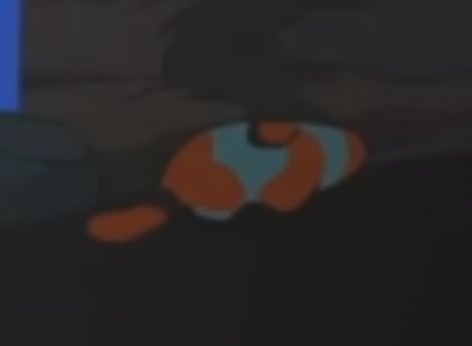
Clownfish: they usually inhabit anemones, forming a mutualism in which they find shelter and food. Toxins from anemones don't affect them as they develop immunity to them throughout their lives to eventually live in them. Anemones benefit from clownfishes cleaning its tentacles. Clownfish often eat parasites and are also known to steal more food from anemones than what they give in return. They are also capable of changing sex from male to female. Seeing this particular species depicted tells us a lot not only about haruka, but about his relationship with Muu, as for the first time it's not depicted as a mutual need, a codependency that endangers their lives if they become separated, but a mutually beneficial relationship where both can exist separately, but live much more comfortably by relating to each other in this way.
Extra: Insects (specifically butterflies) and parasites.
The symbolism of transformation and metamorphosis is so present that it even took the title of both voice dramas. Caterpillars can only wriggle and are no different from any worthless worm, but after a season, they manage to transform into a butterfly: beautiful, admirable, much more memorable and lovable. Having been forgiven and meeting Muu, Haruka manages to "fulfill" his metamorphosis and become someone he believes is better.
Still, from what is shown in AKAA, it doesn't seem that Haruka is entirely happy with this change happening - the monarch butterflies represents ambition and perseverance, but it seems to be rejected by haruka, who crushes it in his hands
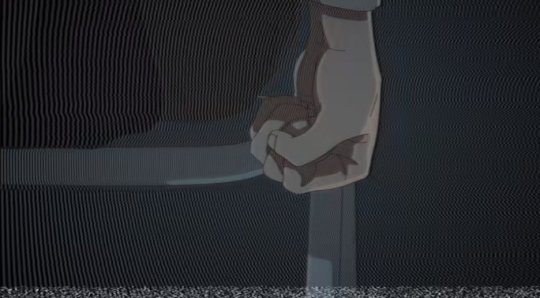
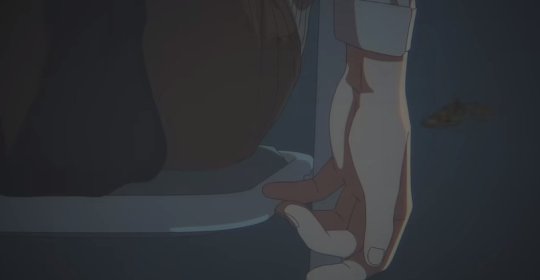
Haruka longs for this transformation, but is unable to fully accept it happening. I think it's because no matter how much he changes and wants to be someone else, he can't get rid of the disastrous image he has of himself, or he has forced himself not to change so as not to be disliked even more by others.
Now, Kotoko is an important figure to Haruka despite not interacting much. It highlights both his codependency (or mutually beneficial relationship) with Muu as much as the fact that he assimilates a parasite.

This is a point I've made several times before, but Haruka's way of socializing is based on taking parts of others and melding them on himself, especially women. It started by stealing his mother's necklace and taking it as his own, continues by killing Mirai and stealing what he lacks, and ends now in a much more obvious way with Muu, imitating her personality, accepting her accessories and the clothes she chooses for him and even copying her sprite pose a bit.
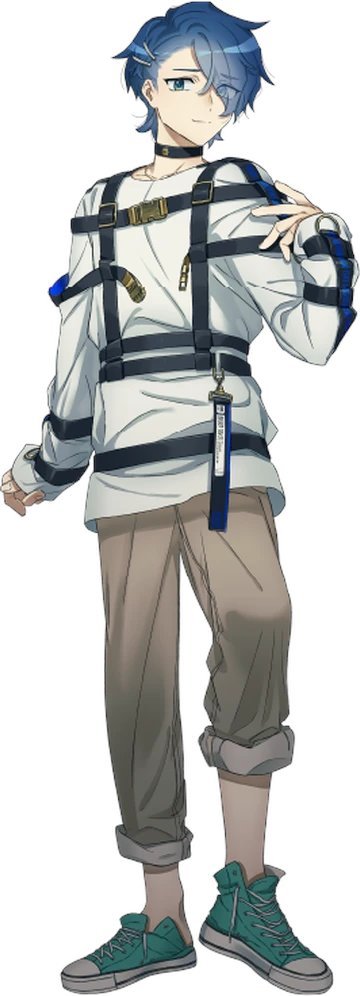

If he had become closer to Yuno and Mahiru, I'm sure he would also start imitating their behaviors in one way or another. Haruka lives by taking parts of the women he surrounds herself with, and he seems to want to take something from kotoko as well, but it's still unclear what he wants.
What does all of this have in common?
Not only is the theme of change and rebirth prominent, but every animal that Haruka comes to hurt relates in one way or another to his desires, thoughts, or parts of himself. Figuratively, we can say that Haruka's case is about him eliminating and hiding every part of himself, until he murders his human victim, Mirai, who at the same time is the closest and most prominent part in him, with whom he wishes he could reconcile and exist together, accepting each other - for, unlike his other victims, Mirai is often presented as a friend and someone Haruka misses. I have yet to write Mirai's analysis on its own, so whether she is also a part of Haruka or not and whether all his kills are figurative is up to each one's choice, I tend to wander between both sides because I like both scenarios.
In a less figurative way and taking the case more literally, these facts are simple trivia and interesting symbolism to consider when analyzing Haruka.
#milgram#haruka sakurai#milgram analysis#Weakness analysis#Akaa analysis#Analysis#I'm **SHAKING** DO WE ALL SEE ALL OF THESE HARUKA AS QUEER - GNC - MTF HINTS???#I HOEP WE ALL DO!!#Twt moot infected me with the haruka MTF disease and now I see it everywhere#There are a lot of queer motifs on haruka's story it drives me actually insane. It's so visceral#Anyways I hope you guys like this#It's been a lot since ive last posted an analysis and I really wanted to talk about this#I also want to write something specifically about Mirai and all of the possible interpretations she could have inside haruka's story#Both as a real person and an ideal concept
91 notes
·
View notes
Note
what makes you think mikoto is good rep? specifically, what is it about double that convinces you?
Okay okay, it took me some time to perfectly articulate my thoughts on how MIkotos system isn't horrible rep and instead was tackled... Somewhat well? This was also written after me and another friend who's a system discussed this extensively and how our own situations lowkey match the situation Mikoto himself is facing. Under the cut because I did *not* expect this to get so long </3
To start it off with some debunking of things people have been mentioning as "oh but this proves he's not a system" (after Milgram itself confirmed them as one but oh well), the whole thing on how DID only appears during childhood isn't... Really the full truth? The most common thing to happen with DID is, instead, for someone to develop the conditions for it through their childhood, but the symptoms only start showing when older. I myself was a case of that and while it started around my 6 years, we only had our first split at 14. Mikotos just happen to be later. I personally also think that, during the phone call with his mom, there wouldn't just have a random baby crying noise for no reason. He probably developed it that early, but just didn't split until recently, however that's just my own reading and not anything confirmed.


For the point of "but then, why don't the milgram rules work on John if he is indeed the killer? This proves it's Mikoto who killed", just look at irl court cases of systems. The one being judged will always be the host almost all the times, after all, he's the main one who fronts, and not whichever alter committed the murder. The host and body would be the one in jail etc in a real life prison, not the alter who committed it. Milgram is a perfect parallel to that, with Mikoto being restrained and the Es barrier working on him even if he didn't commit any murder while John, the alter and one who committed the crime, doesn't has any restraints or barrier that work on him. Because Mikoto is the host and core of their system, not John.
Second, some quick system terminology. I'll be using the terms host, protector/persecutor and dormancy on this, so for a quick understanding: Host means that, basically, that alter is the one who mainly fronts and takes care of things, may or may not be the core ("original" person), but at Mikotos case I'll assume he's both the core and the host. Protector is what the name implies, they're alters who have as their purpose to protect the system and body. Persecutors just so happen to be protectors who have more drastic means to do things and will inherently be harmful to the system in a way in another, they are not necessarily bad, and might instead just be misguided and think what they are doing is a solution for a issue and that by doing so they're protecting the system. Finally, dormancy is when an alter of a system... Well, goes into dormancy. They can't come to front anymore and will be "asleep" for some time or even forever depending on the conditions. A inclusion is also possible, where two alters (or more) will become one etc, but I don't think that will be the case for Mikoto.
So, as it's settled, Mikoto is the Host and Core of the system and Orekoto/John is the Protector/Persecutor of it. Let's get to the explanation now.
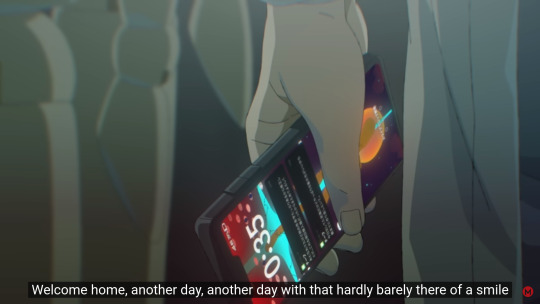
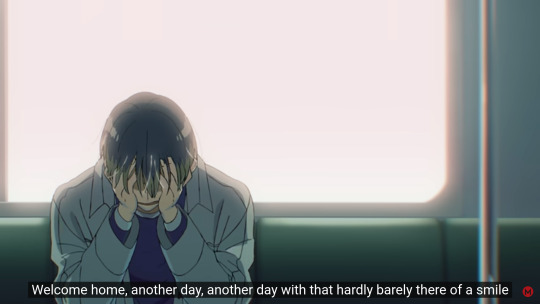
Mikoto's split seemingly very much occurred due to the stress situation he had been feeling from his work. We have John welcoming him home twice through the mv and noticing that Mikoto isn't smiling or anything when coming home anymore and it isn't the only times judging by the "another day" mention. We can see on the second one he's either getting the subway to go home or go to work (probably the first one), but on the first time it's said we get to see Mikoto's phone and, specifically, messages coming through and through.



All the texts are coming from his boss, and from the looks of it Mikoto works for a black company in Japan, so it's no wonder he's stressed and very clearly depressed there. Judging by the time Mikoto would be going back home at midnight and, at that time, he's texted by his boss that he needs to remake a whole product and correct mistakes from another thing for the next day of work, and with "next day" you can bet they mean "when i see you in around 10 hours". For now, this is the main reasoning and sustenance we have for "but why did he split?", aka, Mikoto was under a lot of stress on work and it lingered even when he was home to the point that, eventually, John split as himself and, as himself said, he's got Mikoto, and he could leave it all to him.
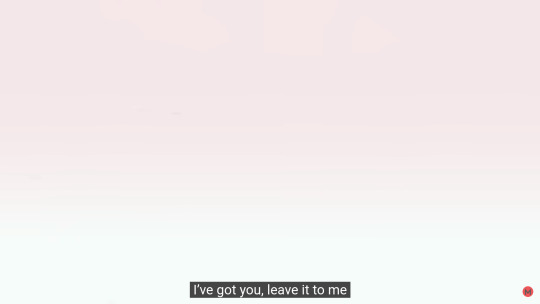
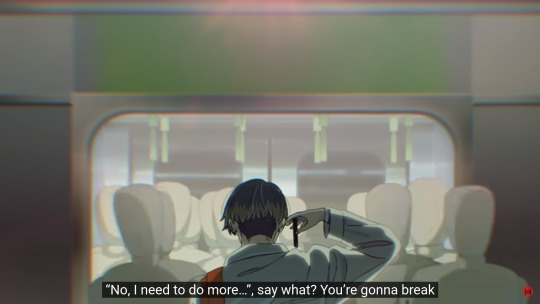
By this point I like to think it was already John fronting to reply to the boss call. John got tired of Mikoto overworking himself to the brink of breaking down to appease to his boss and superiors and, wanting to help, came to front to "take it all on" in his own words. I think bringing MeMe up for Double discussion is extremely important because we have to remember that MeMe was visibly only from Mikoto's point of view while in Double we have John telling his own point of view. I don't think Mikoto is lying about not knowing he's a system etc, but instead that Mikoto thinks something is wrong, yes, that he knows whoever this person ruining his life is both not him and him at the same time (mirror scene), but isn't aware exactly that he's a system. John is portrayed as scary and evil and cruel etc in MeMe because that's what Mikoto assumes to be happening, Mikoto doesn't know whatever John is doing and what are his intentions, we knew since them Mikoto is the type of guy to take things happening to him lightly (joking about the milgram situation etc) because he may think he deserves it, and this extended to his work and personal life. Through MeMe we see Mikoto looking sad and not smiling anytime until we got to the ending in the headspace where he's sitting on the couch somewhat smiling, but not looking downright miserable like he is in double because Mikoto's main focus was that there is some scary guy there, not that his work life was putting him under so much strain to the point of splitting. Hell, his work life was never brought up until Double anyways, because Mikoto didn't think it was important and kept playing as if it was cool (even during the call with his mom in Double, as John showed us) and that he could handle it, meanwhile Double has John showing us just how miserable Mikoto looked after work and some situations that would happen on his day to day work, how he never went back home smiling etc. MeMe has a bigger focus on Mikoto, as a Host, not knowing that he's a system and how scary that can feel when you're fully unaware of why you're seemingly doing certain actions that you're not aware of when they're brought up to you, meanwhile Double focuses on his alter, John, telling us about his own motivations and the truth about Mikoto's daily life, showing us that whatever it is he did was to protect Mikoto because being a protector is his role in the system. Mikoto didn't take his issues seriously in MeMe, and in Double John gives us a glimpse on how bad it was. For Mikoto, all of his personal issues were coming from the fact that there was an Evil Scary Serial Killer guy around, while John tells us that nuh uh, it was capitalism all along and he'll protect Mikoto from that stress.
The voice drama also tracks some of these points, such as Es mentioning that Mikoto laughs whenever he's troubled and rarely gets angry or frustrated, ignoring problems, and Es mentioning that John acts more rationally, contrary to what he expected... After all, Es' only views of John came from MeMe as a mv, and then from John getting angry and frustrated as Es because, in the beginning, to John it all felt like people were trying to trouble and hurt Mikoto yet again. He was just doing his job as a protector.


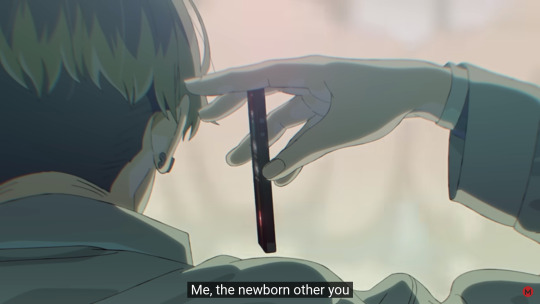

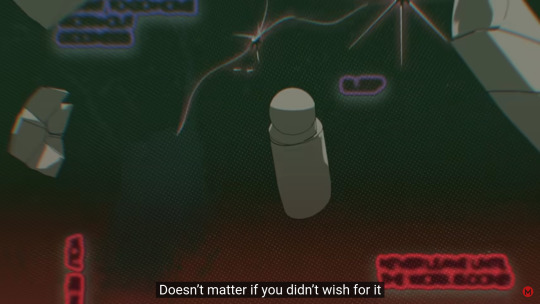
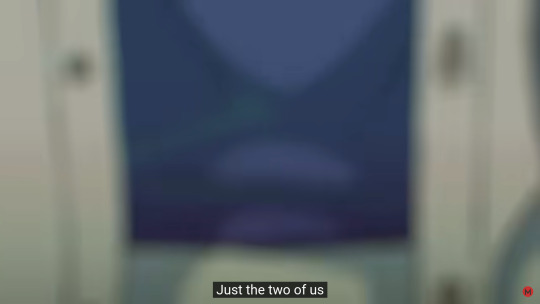
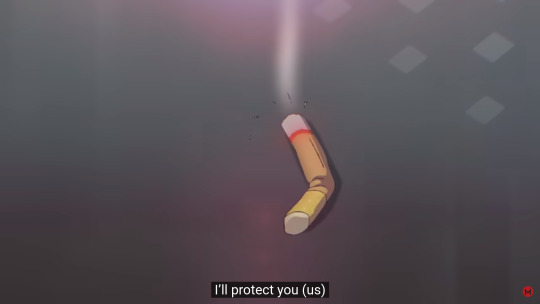

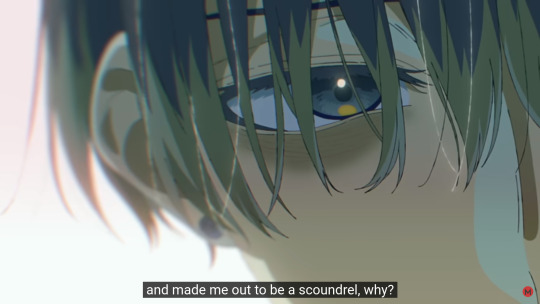
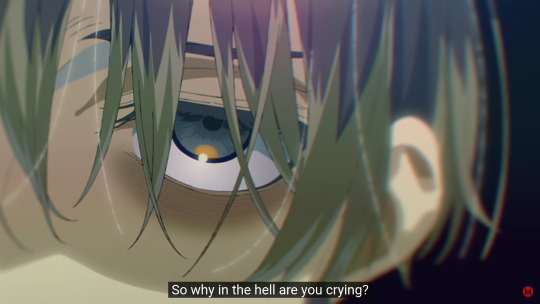
I've seen most people say that the "made me a scoundrel" refers to us, the viewers, but also... I feel it might also just be John talking with Mikoto himself. Mikoto saw John as a evil bad alter on MeMe as we just discussed, and from what we see here... Yes, John is violent and impulsive, but he's still a protector who did things with the goal of "I need to protect Mikoto" in mind. We didn't knew that through the entirety of MeMe because Mikoto himself didn't know, and John might be frustrated that the guilty verdict could have come only because Mikoto portrayed himself in such a way first and foremost. John asks him why he's crying because I'm fairly sure he isn't aware that Mikoto isn't aware of him either. The main issue at play here is the fact their system communication is horrible if not non existent. They can't communicate with each other properly for some reason even through writing etc, so there's no way for them to be certain of how the other feels. There's no way for Mikoto to know why John was doing all that. There's no way for Mikoto to know John was trying to protect and help him.

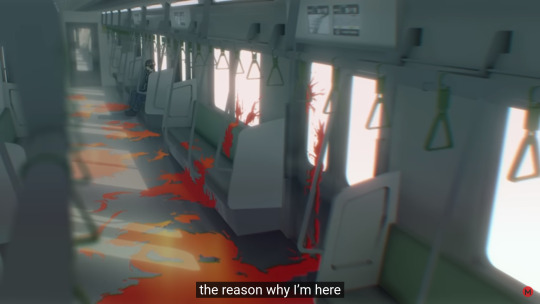

John in the middle of Double even states that he doesn't know why he's there. So yes, most of us are all assuming it was all due to Mikoto's stress with work, but hell we could all be wrong because, again, Mikoto refuses to open up and actually talk about issues with anyone. "Come to know me as an honest man" is John asking for all of us and Es to go and know him as himself, as John the alter, and not the vision Mikoto had of him on MeMe and the entirety of trial one. Because yes, you can't change the violent nature of his, but we should at least come to know and understand that he is a protector and was simply trying his best to protect Mikoto from something (what? We don't know and can't be sure, but yet again, our best bet for now is his job). John is seemingly willing to open up more this trial, admitting he is indeed the one who committed the murder and asking Es to understand the situation they're being put under, with Mikoto feeling stressed and please forgive him, because Mikoto is not the one who committed the murders. I'm sure we will get more on their situation etc when the questions for Mikoto and Kotoko come, but for now we only have that.
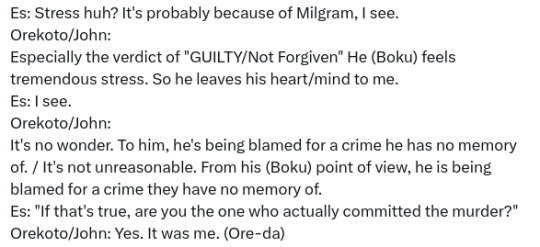
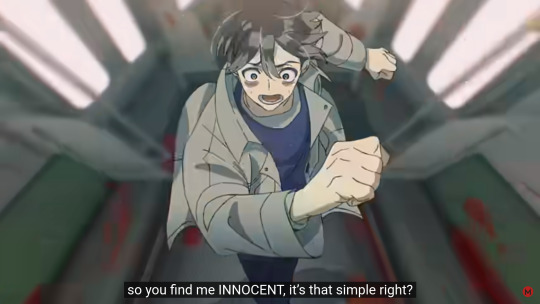
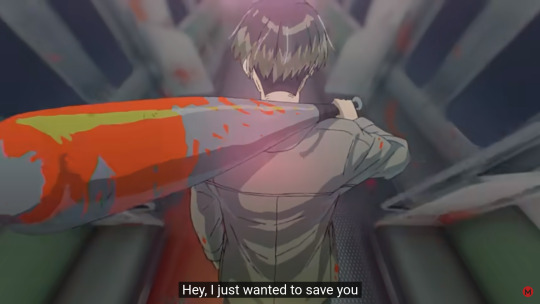
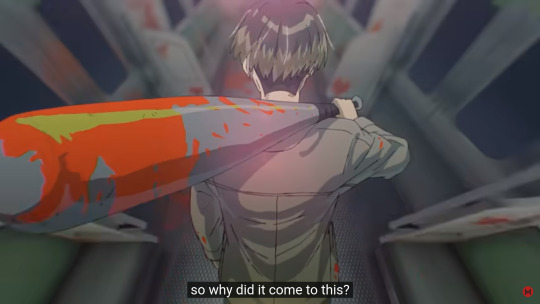
John simply wished to save and protect Mikoto, he himself doesn't know how it all ended like *this* (Mikoto as guilty and not innocent, running away from him on the train because, again, Mikoto isn't aware John is simply trying to help him). Having John asking us to forgive Mikoto many times through both the mv (first image of these 3) and voice drama (next screenshot) basically affirms his beliefs and wishes, that he wants us to guilt him, but not Mikoto. After all, if we get another guilty verdict? In his own words Mikoto will go into dormancy due to the stressful situations of having two guilty verdicts in a row, but if Mikoto gets a innocent this time around? Then, there will be less need for John to front... After all, if the situation becomes a bit more calming for them, then John's purpose of protecting Mikoto will be gone for some time... What we can't have, however, Is Mikoto going into dormancy and then forcing John as the new host, because John wouldn't know what to do by then. He was born to be a protector and his identity is intrinsically connected to this role, the duty of protecting Mikoto, for him, comes above him as his own person. With Mikoto's dormancy, John himself would lose his purpose and motive of existing.

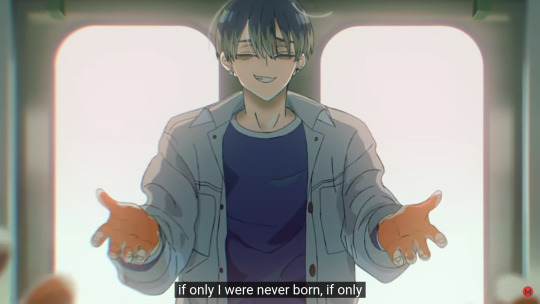
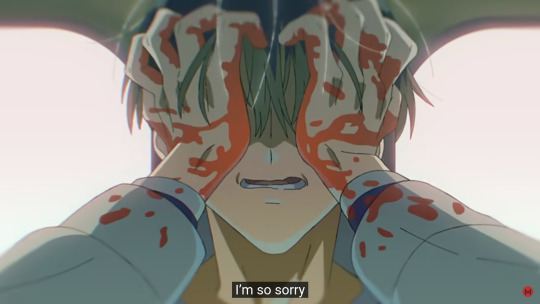
And even so, John apologizes at the end of the milgram, questioning even his own existence that "none of this wouldn't have happened if I wasn't even born". In John's eyes, he failed on his role of a protector by getting Mikoto into this situation. The protector guilt is shown so greatly on John that I did tear up a bit when first watching the Double mv and reading the lyrics. The fact they expanded away from the "scary evil alter" troupe that Mikoto made us belief in trial 1 into a protector/persecutor who feels guilt that his actions caused harm to the host? Into a protector with low empathy who cares more for the well being of their host than his own? Mikoto was neutral on the scale of "is this good system rep" for me initially because, again, Mikoto himself didn't know he was a system. Now we got more information on how things work thanks to John and, from the feelings of how scary finding out there's someone else besides you to the fear of realizing that the person who did whatever the hell it was wasn't you mentally, but it physically was you at the same time is terrifying. I think their writing was very well handled to cover the topics of fear and guilt from both sides. Mikoto is still a host who's unaware of the fact he's a system. John is a protector who feels like he failed on his role after getting Mikoto into this mess. Their communication, due to seemingly being a recent split, is non existent so they cant fully talk with each other to comprehend the other. To me, this is a perfect example of how it felt when I myself found out I wasn't a singlet. I don't think Mikoto's writing is perfect and has no flaws, not at all, but on the grander scale of things? Having this type of rep coming from a japanese song media franchise is great and almost unseen since it's mostly always used as a joke or for the scary evil alter trope alone. Milgram and the team could do some stuff better, sure, but from what we have right now? It's far from me of calling them "bad system representation". After all, just like John tells Mikoto, they're both doing their best.

175 notes
·
View notes
Text
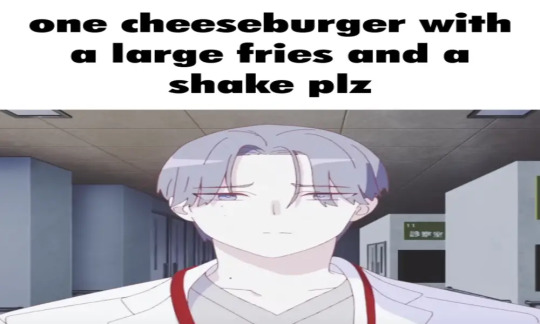
As an honorary Shidou apologist, I am breaking my silence. I’ve finally decided to go on a rant on why I don't think Kirisaki Shidou is an organ harvester.
(fair warning I like absolutely suck ass at organizing my thoughts, so if some of this is incoherent or if it seems like i'm repeating myself my bad 😭 I mainly wrote this for fun)
So, I'm aware that this theory is the most popular consensus when it comes to Shidou (and tbh, I think part of it is because a lot of people kinda look over him? Like at least a tiny bit more than the others, considering a lot of people also don’t realize how his main victim was probably his son and not his wife, but I digress) (plus I think all milgram characters are looked over to a certain extent). While I do think parts of it are probably accurate in some way, I don't think he was a full-on organ harvester (as in he actively stole from patients through illegal means. emphasis on actively) and that the theory in and of itself is flimsy at best. He's morally questionable, yes, but it’s more in the sense that he’s a somewhat apathetic guy who lacked understanding on how his own set of morals and values (i.e. pushing for organ donation) could be seen as wrong. So if he were an organ harvester, wouldn’t he be aware that it’s illegal? That’s what confuses me whenever people bring it up. I don't actually doubt that he may have done something illegal for his family's sake, it’s just that I still highly doubt it was something he actively did. And that seems to be what a lot of people think when they refer to the theory. (if i’m wrong please forgive me, i just assume organ harvester shidou = people think he did it as a job)
Anyways, more under the cut for those interested (it's a bit lengthy my apologies)
It then kinda trickles down to how his guilt stems more from the consequences of his actions rather than the actual action of taking organs. The root of his guilt comes from the realization that basically asking families to pull the plug and use their loved ones' organs for donation is a very, very hard decision; one that he kept pressuring for. If he was an illegal organ harvester, and was aware that his actions were in fact illegal, why the hell would he feel so guilty to the point that he’d start having suicidal ideations? That’s the key difference between his profession and his possible criminal activities; one is a burden both emotionally and morally, the other is more or less a literal burden. And based off of Shidou's character, he seems to be much more emotionally affected. That's also why I think a lot of people jump to the conclusion that his guilt stems from his actual actions rather than their effects. (does that make sense oh lord i am going ☝️🤓 so hard rn)
I get that some parts of his MV or lyrics seem to be suggesting that, but also it’s important to note that Shidou has a very strong bias against himself and definitely painted himself in a negative light. I mean, that's why he thinks every single preceding patient before the final incident is a victim to him, why he shows himself staying professional in a professional setting as apathetic (minus the pressuring part), and why he literally equates his job to STEALING. Not only that but, imo, it's also a little too unrealistic and might not actually fit the criteria of Milgram. Milgram is for crimes that are in a morally grey area. So if it really was organ harvesting, is it really in a grey area? (though I guess you could say that doing it for family's sake would be, but that's only for his family. He'd have no reason to do it otherwise). Plus, it'd make more sense and fit the theme of touching upon social issues (i.e. abortion, bullying, societal standards, mental health, etc.) if shidou’s entire dilemma was in regards to (albeit questionably done) organ donation, a complicated ethical topic in Japan.
Throw Down actually gives a pretty good rough idea of Shidou's thoughts towards his crime and his feelings in regards to it. He felt like he was blinded by his own values, and that inadvertently caused him to be unaware of the suffering he caused through his job. It really does shock me that he somehow was able to pull-off getting a forgiven verdict in T1 because he certainly comes off as cold and uncaring in regards to his work.
I think the final bridge in Throw Down kinda summarizes his entire mindset, actually.
Now slowly close your eye, put your regret on display
Wishing you for someone else's sake
With the same expression no matter who comes
I don’t feel scared because I don’t know
Shidou doesn't quite understand the feelings of his patient's families, and therefore he acts remorseful and sympathetic more than he actually feels. Why? Well, because he didn't know. Up until that point, he never understood the weight of his actions, and focused on his role as a doctor. "This is an upsetting subject, yes, but it's for the greater good, right?” A braindead person has little to no chances of living, so why not use this as an opportunity to donate their organs? Moreover, as a doctor I believe it’s typical to be "emotionally detached” (for lack of a better word) since I’d assume becoming emotionally connected with a patient would make things at least a bit messy.
His mindset comes crumbling down though, presumably because he experienced the same or a similar situation. This part remains muddy for me, since we don't know much about what the actual cause for Shidou's guilt is. There are several possibilities, with the most plausible ones being:
he lost his own family member and had to go through with the same decision,
he tried to save a family member using donated organs, but failed, making it seem like everything he has done as a doctor was in vain
(a secret third option would be him making someone he cares about make that decision but it's very unlikely and also requires too much mental gymnastics)
But no matter what exactly he did, it all trickles down to the validity of his morals. After realizing the pain of losing a loved one, the struggle of trying to save them, and the unfortunate failure which left all efforts practically pointless, Shidou would understand the actual weight of his actions and why all those families were so reluctant to let go of their own.
This is even more evident in his T2 voice drama, Asclepius.
"In order to save the life of someone you don't know, please let me kill your family," I told them. It doesn't even take much thinking to realize how cruel that is, but… I didn't realize it until the very end.
This is the gist of Shidou's crime, or at least part of it (considering he says "Well, about halfway" when Es asks if their judgment was right). Again, this tells us that Shidou's guilt comes from the act of the effects of organ donation rather than the literal action. And this also implies that his "murders" did in fact have to do with being in a medical situation, it's just the way he went about it was at the very least morally questionable.
I will also acknowledge that he says he killed for selfish reasons, which most likely relates to trying to save his own family member. Here he could possibly have actually done something illegal such as tampering with patients or illegally taking their organs (latter is a stretch imo). Plus, his distorted T2 voice trailer line is literally "You're in the way, hurry up and die" which would only make sense in the context of waiting for a patient to die. But it could also just be him continuing to pressure for organ donation, but now with his own selfish motives.
Going back to the "halfway" comment, while I personally believe it might have to do with how Shidou views his crime as more than just taking organs, it more likely implies that something else happened that Shidou would consider murder. That being the actual death of his family member. It's implied through Throw Down that he was trying to save someone but failed, which he was responsible for. Then from there it'd make sense to assume that he would feel some form of guilt for the rest of his patients, either for the reason of failing to actually utilize donated organs even with the opportunity of being able to save them, or for just realizing the what it actually feels like to have to give up on your loved one. (does. does that make any sense.)
So yeah, I don’t think he’s an organ harvester due to what’s known regarding his crime, the reasoning for his guilt, and with the way he is as a character. The most I’d personally believe is that he decided to harvest organs for the sake of his loved one, but even that seems like a stretch to me. Thus, that is why I believe Kirisaki Shidou is not an organ harvester.
Anyways I’ve rambled on long enough, thank you for reading if you did and remember to drink water and vote shidou innocent in trial 3 because i will shit my pants if he doesn't get inno
#milgram#shidou kirisaki#kirisaki shidou#milgram analysis#everyone point and laugh at me for writing so much#i am so terrified i said something wrong like if i did then strike me dead#kirisaki shidou DESTROYED MY LIFE#i love the pathetic failure doctor#i swear on my life he'll get 3 innos no matter what#shidou i am begging you do not pull out some bs that'll make you seem less favorable than you already are#chibi's ramblings
84 notes
·
View notes
Text
milgram anniversary art let's go
i will probably edit the analysis many times
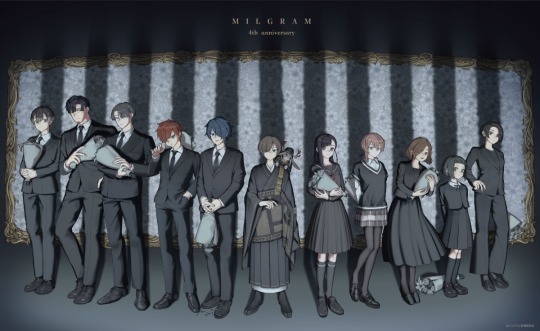
some things i wanna point out about (left to right):
mikoto's holding his bouquet properly
kazui's holding his bouquet casually (i think) and putting it close to his heart
shidou's holding his bouquet casually (i guess), he's cradling it i think
fuuta's holding his bouquet behind him like a bat
haruka's holding his bouquet in a shy and timid way (the petals also fell)
all of the men are wearing black suits with white shirts and black ties, normally used during japanese funerals
es is wearing something presumably a yukata (or more of a kimono) with the warden color pallette with the sashes (previously on their robe) on their left shoulder and elbow
yuno's holding her bouquet like cradling a baby, she is wearing a school uniform similiar to the one she used in 'umbilical' but in black
muu's holding her bouquet behind her, she is wearing her school uniform without her brown blazer and her bow but in black
mahiru's holding her bouquet close to her heart, she is wearing an average black dress
amane's not holding her bouquet, she is wearing an outfit similiar to her school uniform in 'the purge march' but in black
kotoko's holding her bouquet behind her (sort of), she is wearing a top that looks similiar to her warden outfit in 'deepcover' but in black
all of the women are wearing dresses that are black, normally used for japanese funerals
i find it interesting how es is the only one wearing a traditional yukata (or kimono)
76 notes
·
View notes
Text
Mikoto T2 Neoplasm Voice Drama Translation
Take my translation with a grain of salt. I did try my best.
Es: Mikoto
Mikoto: Oh…Hey Warden,
Es: You… are Mikoto right?
Mikoto: Eh? What are you talking about?
It feels like it's been a while, doesn't it?
Have you been well? Huh? What is this? Chains? I hate these, Take them off
Es: Request denied. You are too dangerous. Physical restraint is essential.
Mikoto: Uh.. Um… What are you saying, capturing such a harmless person like me?
Es: As I thought, you have no self-awareness.
Mikoto: Well, I get it. I must have caused a ruckus while I was asleep, right? Everyone told me that I really went all out with the chaos.
Es: It seems so.
Mikoto: I guess it's something like sleepwalking disorder. Lately I've been feeling drowsy more frequently too.
Oh man, that's troublesome, isn't it?
Es: Mikoto…
Mikoto: I can tell from everyone's attitude that they're scared of me. I can read the room/atmosphere… I…
Es: Hmm…
Mikoto: It's frustrating, isn't it? I've been confused ever since I got here.
Es: You really laugh when you're in pain/troubled, don't you?
Mikoto: Eh?
Es: You don't get angry or yell. You laugh like you're in a bind/at a loss.
Mikoto: That sounds about right. I might have that kind of trait. Usually, if I laugh and gloss it over, things go well. I'm good at that kind of thing, so I manage somehow. But, it doesn't end, does it? My head is filled with things I have no memory of doing.
Orekoto: I constantly feel irritated
Es: There it is.
Orekoto: Seems like you haven't been beaten up enough, huh, you brat of a guard.
Es: Ah… Gr…..
Orekoto: Hah? Cat got your tongue?
Es: Even though you got done in by Kotoko.
Orekoto: That was just because I was caught off guard. We fought while you were asleep, it's not like I lost or anything.
Es: Multiple personality disorder. Is it correct to understand that you, who are speaking now, are a separate personality from the Mikoto earlier?
Mikoto: You're accepting this quite normally, aren't you. Multiple personalities is ridiculous, right?
Es: Yes. I didn't think something like that could really exist either.
Mikoto: Yeah, exactly. If it wasn't me, I wouldn't believe it either. I'd just think it's a lie to escape the guilt of killing someone.
Es: However, Milgram recognizes you as such. I'm just accepting it as fact and moving my thoughts forward. So, what should I call you?
Orekoto: I don't know man. Call me whatever you want.
Es: For convenience, I will call you John.
Orekoto: That's a dog-like name.
Es: It's used to refer to a person of unknown identity. It comes from "John Doe". Do you like it?
Orekoto: Is it okay to show off knowledge like that?
Es: But you seem quite calm today. I thought you were a monster. I didn't expect we could communicate this well.
Orekoto/John: Don't get cocky. If it wasn't for these chains your face would be smashed in by now brat.
Es: Oh? How scary. I'm scared. /s
Mikoto: Hmph.
Es: Then you are not Milgram's prisoner. The best proof is that Milgram's restraints are not effective on you. Milgram has judged Mikoto to be the prisoner, while you, a separate personality, are an exception.
Orekoto/John: Ah I see. So for you, multiple personalities has been anything but confirmed.
Es: That's why today, chair creaks I thought I'd hear you out as an important witness. I'm very glad we are able to have a proper conversation.
Orekoto/John: But you know, this isn't a good thing. Probably.
Es: What are you trying to say?
Orekoto/John:
I(Boku) might be disappearing (?!)
Es: gasps
Orekoto/John:
Clearly, the time I'm(ore) out in front is getting longer. Thanks to that, my existence is becoming more stable. Isn't that the reason we can talk properly now?
Es: makes a concerned sound
Orekoto/John:
Maybe it would have been better if I (ore) stayed a monster.
… Oh? What's with that look?
Es: I'm surprised to hear you speak so rationally, contrary to what I expected.
Orekoto: I have a college degree after all. How does one develop Multiple Personality Disorder?
Es: To be precise, it is called Dissociative Identity Disorder. Generally, it is thought to occur when another personality is created and separated in order to protect oneself from suffering, stress, trauma, etc.
Orekoto/John: Hm.
多分俺は僕の受けたストレスを解消するために出てきてる。俺が長く出てるってことは、それだけ僕が強いストレスを受け続けているわけだ。
I'm (ore) probably emerging to relieve the stress he's (Boku) under. The fact that I'm (ore) out for longer means he's (boku) under more severe constant stress.
Es: Stress huh? It's probably because of Milgram, I see.
Orekoto/John: Especially the verdict of "GUILTY/Not Forgiven" He (Boku) feels tremendous stress. So he leaves his heart/mind to me.
Es: I see.
Orekoto/John: It's no wonder. To him, he's being blamed for a crime he has no memory of. / It's not unreasonable. From his (Boku) point of view, he is being blamed for a crime they have no memory of.
Es: "If that's true, are you the one who actually committed the murder?"
Orekoto/John: Yes. It was me. (Ore-da)
Orekoto/John: I'm (ore) the one who killed them.
Es: ん…
Orekoto/John: So, I (Boku) really didn't do it.
Es: Why did you kill them? Let's hear your explanation.
Orekoto/John: (むしゃくしゃして。) I was frustrated.
Es: Who did you kill?
Orekoto/John: (そこら辺歩いてた奴。) Some guy who was walking around.
Es: How many did you kill?
Orekoto/John: I don't remember. That was the first time I emerged. It's hazy.
Es: You have the audacity to say that without any shame.
Orekoto/John: Legally speaking, what would happen to me?
Es: You might get a reduced sentence based on a psychological evaluation, but depending on the number of people you killed, you might not be able to avoid the death penalty.
Orekoto/John: (いや、やったのは俺だ。僕は寝ていただけだ。)
No, I (ore) was the one who did it. He (Boku) was just sleeping.
Es: As if things could be that convenient.
Orekoto/John (Boku):
僕の身にもなってやれよ。僕はただストレスに耐えていただけなんだぜ。一人でじっと耐えていたんだ。爆発するまで誰かを傷つけようなんて考えてなかったんだよ。
Put yourself in my shoes. I (boku) was just enduring the stress, that's all. I (boku) was enduring it alone. I (boku) never thought about hurting anyone until it reached a breaking point.
そういうことができない奴なんだ。気を使って空気を見て、周りの顔色を窺ってばっかで、そういうことができないから、爆発しそうだったから俺が生まれたんだ。あんまりだろう。何も捨てねえんだぞ。
I'm (boku) not the kind of guy who can do that. I'm (boku) always worried about the atmosphere/the room, watching people's expressions, so I (boku) can't do things like that. That's why I (boku) was about to explode, so I (ore) was born. It's too much. I (boku) haven't done anything wrong!
Es: Even if that's how it was, even if it wasn't Mikoto's intention, human lives have been lost.
Orekoto/John: Urgh…
Es: Even if the one inside was you, John, there's no way to prove it. At the very least, it won't fully hold up in court. It could even be deemed as a lie.
Orekoto/John: YOU!!
Es: !
Orekoto/John: (お前はどう思うんだ?) What do YOU actually think?! Es: Mine?
Orekoto/John: I (ore) did it. He (boku) didn't do it. You're just going by what Milgram says. Why the hell does it matter what the justice/criminal system thinks, what about YOUR judgement?! What do you think about me?
Es: ...
Orekoto/John: Forgive me (Boku) already. I'm (ore) the one who did it...
Es: I can't judge right away. It's not something I can decide to forgive so easily. In fact, Mikoto's mindset/emotional landscape was far too cruel. I judged not to forgive. / I've decided not to forgive.
Orekoto/John: (You're saying that because you think) That's probably because multiple personalities could be fake. I (boku) truly did nothing wrong. I (ore) was the one who killed.
Es: …
Orekoto/John: Can you be satisfied with that? Imagine waking up in the morning and finding out you've become a murderer.
Es: The act of creating you could be called a sin. / It might be said that the sin is in having given birth to you.
Orekoto/John: !!!!!!!!!!!!
… You are probably right…
Orekoto/John:
I (ore) am his (boku) ideal self. I'm (ore) the one who doesn't just lie down and resign ourselves to unfairness and stress. If I (Ore) hadn't been born, he (Boku) would have surely reached his limit and broken down.
Es: Then… you…
Orekoto/John: It's true that I (boku) wished for an existence that could break everything. Maybe it's because of my (Boku's) weakness that I couldn't face it alone. But that's all. Is that a sin/crime?
Es: That's for us to consider moving forward.
Orekoto/John: Talking with you, I (ore) understand that what I (ore) did cannot be forgiven. I (ore) accept that.
Es: Yeah, that's right.
Orekoto/John: Milgram's subject of judgment is him (Boku), Mikoto. Not me (ore)… John that is.
Es: That is correct.
Orekoto/John: Please forgive him (boku). Otherwise he (boku) won't be able to endure anymore.
Es: I see, you want me to decide that since it was another other personality that committed the crime, it doesn't count as his (Boku's) sin.
Orekoto/John: Yes. If you forgive him (Boku), then I'll disappear.
Es: !!
Orekoto/John: That's right, in the end I (ore) have to vanish. I'll take on everything and vanish. I will.
…Because I (ore) was born to protect him (boku).
Es: For that purpose. You were born.
Orekoto/John: If it's to protect him (Boku), then I'll do anything.
Bell Chimes
Es: John…
Mikoto: Hm? What is it? A dog's name?
Es: Mikoto…
Mikoto: Warden, you have a pet dog? What kind of breed is it? Wait, let me think, not a Toy Poodle, but I might surprisingly like the ones that are ugly-cute. Not a French Bulldog or anything like that.
Es: That's not it. (irritated)
Mikoto: Then a pug?
Es: It's not a dog's name!
Mikoto: Ehh? Then, what is it?
Es: It's the name of your friend.
Mikoto: laughs No way! I don't know anyone with that name!
Es: Deep Inhale I suppose so.
Mikoto: Huh?
Es: Prisoner #9, Mikoto. Sing your sins…
#milgram analysis#milgram translation#milgram#mikoto kayanao#kayano mikoto#neoplasm#voice drama#trial 2
154 notes
·
View notes
Text
How Magic Depicts Pain
(also known as: I told myself to hold back on Amaneposting but the new process shots have made me think)
So in-universe, Magic is a watered down and sanitized version of what actually happened in the cult that switches between from Milgram's usual anime artstyle to a papercut/felt-like storybook one. The general tone of Magic is very high energy and happy. It's a very colorful MV all around.
This doesn't stop the darkness from seeping in of course, most notably in the lyrics and at the end of the MV which involves a stylized depiction of abuse.
I'll get to that part, but before the ending of the song we get two showcases of pain.
The game show scene:
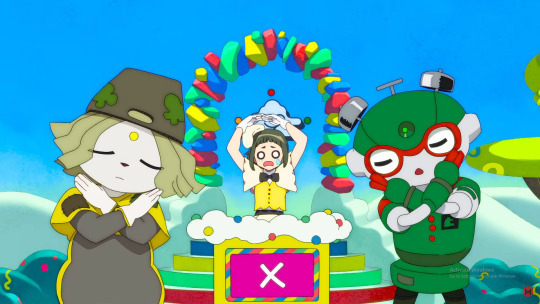
And the stage light scene:
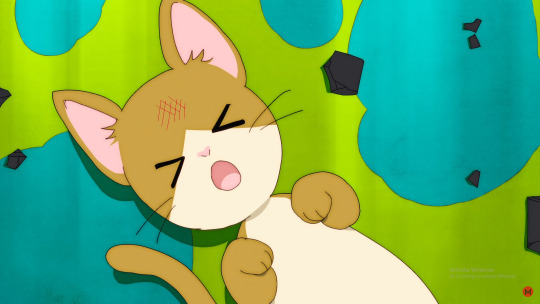
We will get to the stage light in a bit but let's talk about the game show first!
The metaphor isn't subtle. Amane messed up, she said the wrong thing, made a mistake, and so, she gets punished.

It's not treated as anything too serious though, Amane makes silly cartoonish facial expressions, her movements are over exaggerated and silly. It's comedic, it's nothing to be taken too seriously.
Even afterwards Amane gets helped up by (presumably) Yuri, you don't Have to worry. It's all fine and good and not that serious, and even if it, was the two of them help her up! It's a perfectly fine situation with nothing dark lurking under the surface that might suggest otherwise.
Now since the Milgram MVs are taken from the person's mind, most likely, Amane is downplaying the severity of the abuse done to her. Not only that but she's portraying her own pain as an exaggerated and comedic reaction to it. It's not that serious, she's just overreacting.
Amane does this a lot throughout the song and in outside material, she tends to downplay to abuse or explain why it's actually a good thing.
But it’s not scary at all, because it’s love
I can really think it’s great. See isn’t it a great thing?
Amane Momose Does Not Consider Her Own Pain as Something Serious, or at least when it's pain caused by her abusers.
Moving out of the gameshow and into the stage light, the cat's pain is treated in a similar way at first. The scene even directly parallels the game show scene:
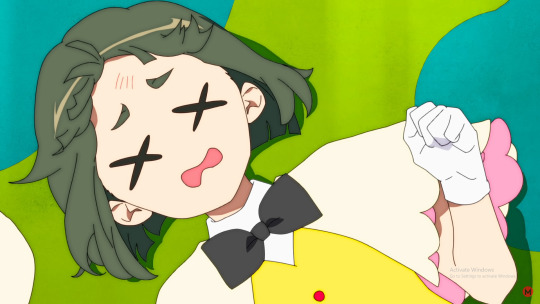

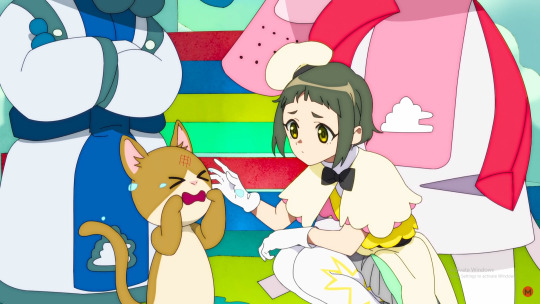
Like with the game show, the reaction to the pain is depicted as something childish, a tantrum over a small scrape, nothing that really needs to be fret over.
Until we switch over to Amane's View:
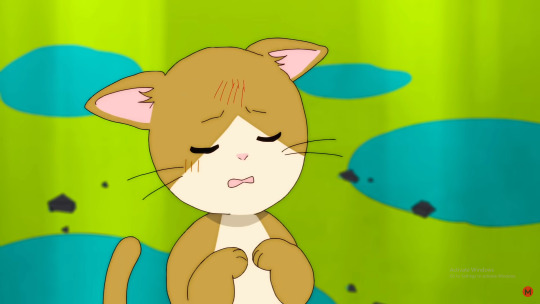
The camera is shaky, the cat isn't crying but hyperventilating. It's still a scrape but instead of the exaggerated criss cross, its a row of scratches on the cat's face, there's even a few on the cat's cheek. It's depicted seriously, there's actually weight to the injury here.
Now, what does Big Sister Amane do? Big Sister Amane who Yuri (after Gachata hurt her) helped just a few moments ago? Big Sister Amane who wants everyone to be happy?
She helps.

She grabs a first aid kit, I don't know How she got it but she does and she does the best she can to to fix the cat up. She's hiding away as she does this, she knows she isn't supposed to but she does it anyway because it helps someone!
And it works! You can see how happy the cat looks in the image. It's not just a vague "we will support you" gesture like the hand Yuri gives Amane. It's an actual tactile action that Helps Someone.
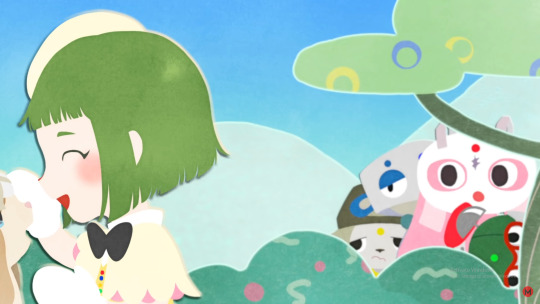
And they can't have that. They can't have Amane help someone out like this.That's against their rules, that's against their beliefs, that's a threat to their control.
So they punish her.
Let's talk about the ending scenes, and the possible torture that Amane went through.
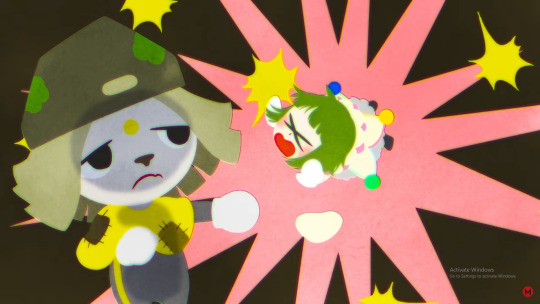
I'm not going to show all of them as that's a whole other post on it's on really, but it's notable that, the most egregious acts of violence and abuse in the entire MV, are sanitized. There turned into storybook images, Amane has exaggerated and cartoony expressions, the mentor figures are far away from Amane and are standing to the side as she's getting hurt.
We know from the process shots that a taser was involved and yet in Magic it's depicted as this:

It's...still bad, it's still depicting electrocution, however instead of a taser being used against her it's an abstract electrical burst. Even now there's a distance between what actually happened and what it shows.
And yet the pain still comes through, even with the storybook visuals, it's not the same as the Game Show where it was turned into a finger flick. It's still depicted as something Painful, just distanced from reality.
It transitions back to the regular art style after Amane prays, or more accurately, begs, that she can be better. She's given a wand (pipe) and wings and is told that yeah she Can be a better girl!
Not that she's already a good girl, only that she can be, eventually.
And, after all, aren't good girls supposed to have hope no matter what?
(End Notes: I hope people like the way I formatted the screenshots lol, I had a lot of fun with it so I hope it flows well!)
#milgram#milgram project#amane momose#008#milgram amane#milgram meta#milgram analysis#I still dont know how to tag these#cw cults#cw child abuse
231 notes
·
View notes
Text
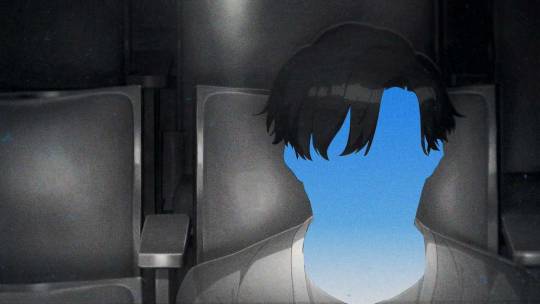
I think it's interesting that Kazui, Mr "My Father wanted me to be a Strong Man" is the only prisoner so far who's Es cover thumbnail is just the different shades of a solid colour.
Yes, blue is the colour of his prison uniform, but I also don't think its a coincidence that they chose the blue = boy colour for our guy over here.
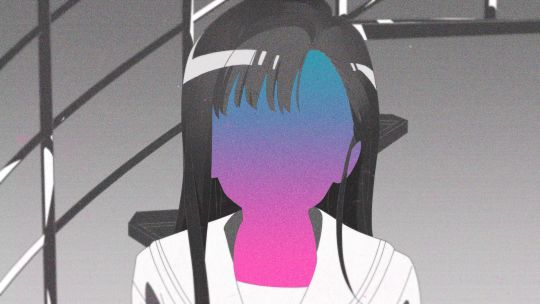
On a similar vein, I think it's interesting how Yuno's two colours are Blue and Pink, especially with their specific placements
The Pink part of Yuno is her Body, which makes sense seeing as that's what her (male) clients are paying for, not Yuno, but the Body and Personality that they enjoy - whether that be for sex or for dates or both.
The Blue part of Yuno is her Brain, aka: where the real Yuno lies. The Yuno that says lines in Teardrop like:
“Poor naive little girl”? So off the mark, what's it to you?"
"INNOCENT? I'm so not that."
It makes me think that the reason why Kazui only has the one colour is because, while the thought of acting different is there - his "dreams" - he feels like they could never be reality, it's not even an option to him, therefore it isn't shown. Only his traditional man facade is there
#does this make sense i hope it makes sense#im playing mister obvious here i think and im aware but look okay i just wanna share my discovery because i rlly like 0207 parallels ...#mars when gender roles in society and the consequences they have on people#i didnt mention but yeah i think the pink = girl colour being yuno's prison colour is also not a coincidence at all#like her name litteraly translates to gentle (and honest) but like!!! thats litteraly why they chose pink as a girl colour in the 1940s#because they viewed pink as a delicate (gentle) colour which suited their “dainty women that need to be protected” idealogy#milgram#kazui mukuhara#yuno kashiki#milgram analysis#i think it counts
87 notes
·
View notes
Text
what lies beneath the facade? an observation of kazui mukuhara's face
my attempt on trying to analyze kazui's feelings! (not sure if this has been pointed out yet im sorry if someone made a similar post. this post has very, VERY brief/minor discussion of sui btw)
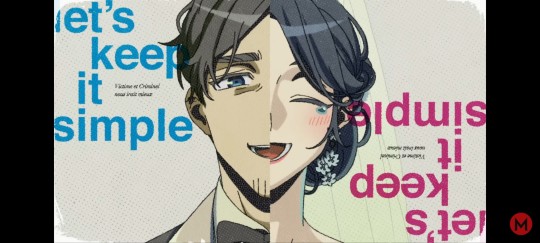
im sure we all know by now that this is kazui's true feelings about his marriage; he hates it, and shows a self deprecating smile to the audience. i think, that the right side of his face where his bangs are longer is where kazui shows his true feelings to us. im gonna put some scenes where i think it's the most damning (while there are other pics I think applies, they may look like im reaching a little, so I won't share those). this is why in some scenes in half/Cat, you may notice that Kazui's expression can look unnatural where this observation is at play.
hell, even in the Cat album cover here, he covers the side of his face where his bangs are longer. this man is trying his best not to show anyone what he really feels. letting the door itself do the talking, so why should he? signifying that he at least, cannot wait what to show Milgram, to show us, what secrets are behind that door. (but also channeling an air of uncertainty doing so)
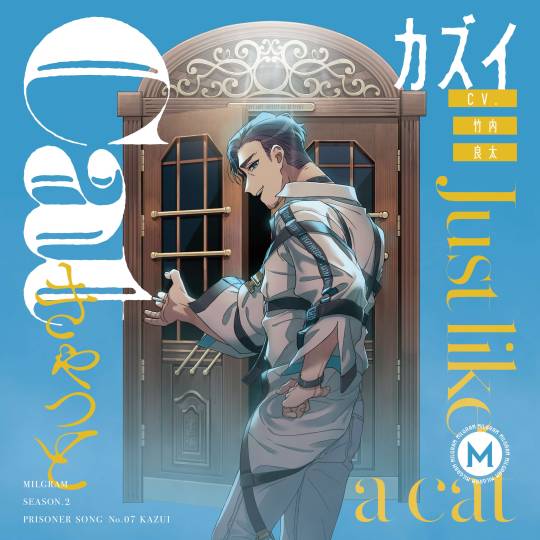
as well as in Undercover, i think it's very interesting that the creators make it a point to show both halves of kazui. when his mugshot gets taken, both of his sides are shown to us. one where he's smiling, and one where he's not. notice how his left side is where he's grinning and his right side is where he's serious?

we only catch his serious expression with one glimpse before he realizes he's being observed and quickly shows us a smile. (then during that scene where they show us which location correlates to which prisoner, the light is shining on the right side of his body. also, kazui is the only prisoner where they show both of his side profiles. the others show 3/4 of their faces)
before i continue, thank you so much for reading in advance!! >_< anyways keep marching on and keep reading this cool post of mine!
more pictures where they emphasise on his "right" being his true self in Cat, where his eyes are shown on the start and end.
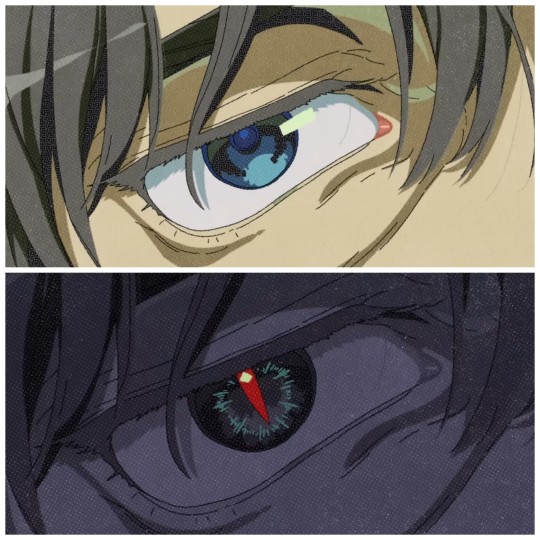
half:
when I took a closer look at these images... was kazui more unhappy being around the long haired woman Vs him and his wife?

left is kazui with his wife, right is kazui with the long haired woman
this next one really gets me a lot. the most clear cut observation that tells us the other half of his face is where he expresses his true self.
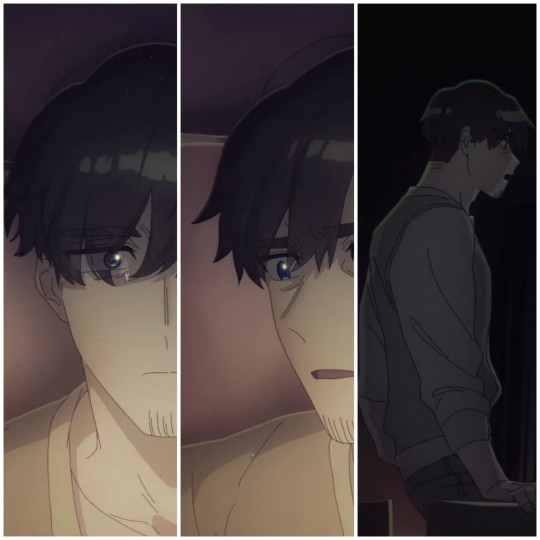
he tears up for one split second, a ball of teardrop forming on his eye. what was something on that stage that made him so emotional?
then he quickly looks away to see something else catching his attention (which was the apple) after he stood up and looked forwards, kazui genuinely looks shocked/surprised.
knowing this observation can also give us a different perspective to some other scenes in half. like this one:

his wife touching his right side of his face. multiple questions pop up in my head when i see this scene.
was she ready to hear kazui out? was she catching onto him that he was hiding a secret/hiding his feelings? or was she trying to comfort that side of his face, as if she was saying "whatever it is you want to tell me, im sure i can handle it." to him?
hinako tries to understand him. tries to "grasp" his true face, his "true self". but kazui can only give a weak, depressing grin, as he gently puts her palm away, balling his fingers around hers. he doesn't know if she's actually ready for it. even though she's gentle with how she holds his "true side".
as we all know, before they zoomed in to this shot of kazui putting her hand down, their silhouettes were blurry. if you weren't close enough, you almost thought she was choking and suffocating him. not only kazui felt like the marriage made him feel like he was in a rut, he was afraid of hinako "suffocating"/disliking his true feelings (or side), even though she is holding it with care. hence why he was putting her hand down.
of course we know it didn't turn out the way he wanted it to turn out, from the next scene here.

kazui is clearly depressed towards the outcomes. at the end of half, his right side is not very happy at all, despite his left side making it look like he's grinning.
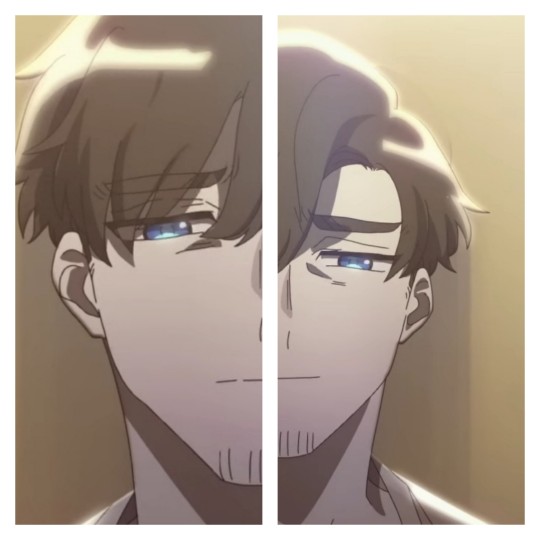
everything is all a mess now.
cat:
after finding out hinako wanted to "touch and caress", kazui genuinely seems interested in this thought and was sincere about what he was feeling here, so he pursues her in hopes those feelings are fulfilled. interestingly, the lyrics "so, it's wrong?" are on the screen when he shows the camera his right side.
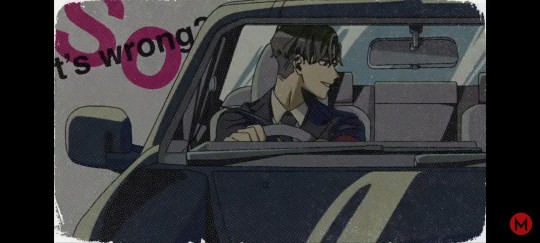

when he proposes to her, he still remains looking at her in this direction, although we can't see how his expression looks like.
unfortunately for hinako though, this is the last time kazui ever looks at her on this side.
during the confession scene, his right side is blocked by the cup, so we actually don't know what he was feeling completely when he asked the question.
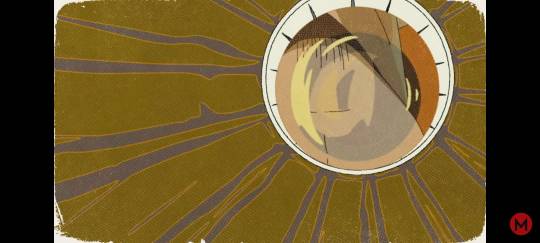
after this scene, we can finally see his right side again, but it's well hidden by kazui blocking that side of his face with a hand and cigarette. giving us a sense of mystery of what transpired after he asked the question.
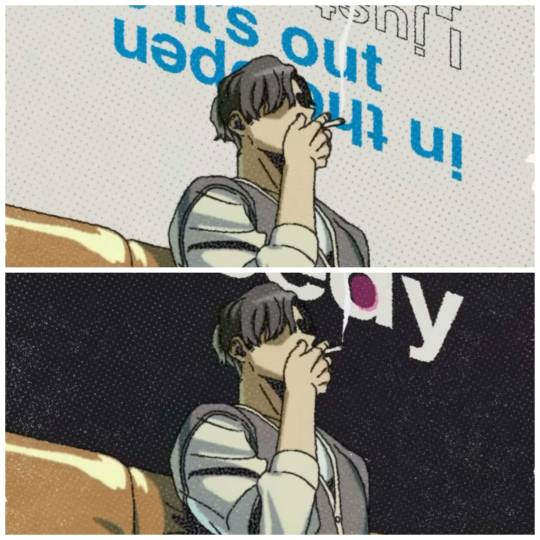
kazui is entertaining his wife with magic tricks while showing his left side to the camera. his "fake" side is what he wants to show to her and to all of us.


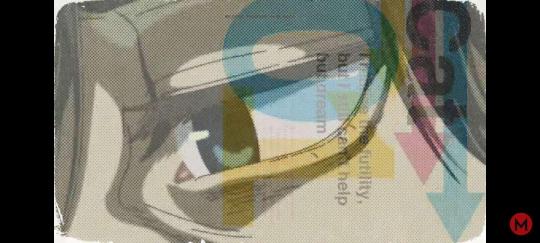

but his left eye squints as he realizes about his dream. his left eye squinting is telling us that his fake side is breaking apart.
then, kazui drops down to his knees. take note of the rope falling down on his left lap.
after getting back up (from what seems like kazui stumbling from drinking 4 cups of alcohol), he rubs the right side of his face. he is really frustrated with himself here.
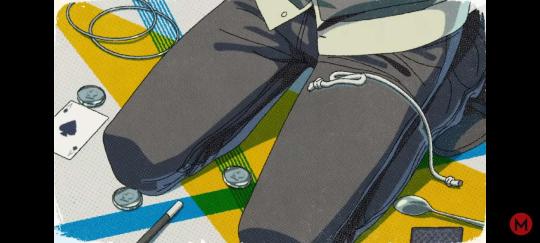
with all of the information we have so far, we can interpret this as kazui desiring to remove his fake, other half of himself (this is the only object we don't see when kazui is showing off his magic tricks, and ropes can be associated with suicide). he is given a choice to remove his left side, his false side, which is why that rope fell down that direction.
as he's about to tell hinako the truth, he transitions from
> lighting a cigarette, his eyes hidden from us

> kazui facepalming himself. as a smoke in a shape of a noose is formed. remember the rope i talked about earlier?
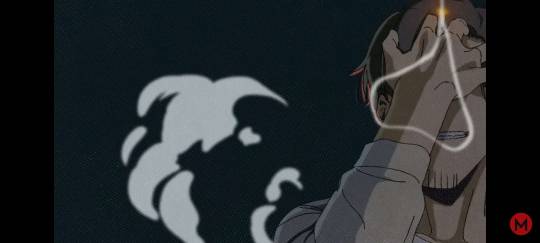
even though the rope initially landed on his left lap, the noose is angled to his right side. he's grasping his right side of the face as well. this, here, is kazui being ashamed of his "true self". if he could, he would want to remove his true self if it meant having to keep lying to people, or if it meant making people happy. kazui is going through with telling hinako the truth, while this scene tells us he is hesitating to do so and is 100% expecting for it to hurt him and her.
> he lets down his hand.
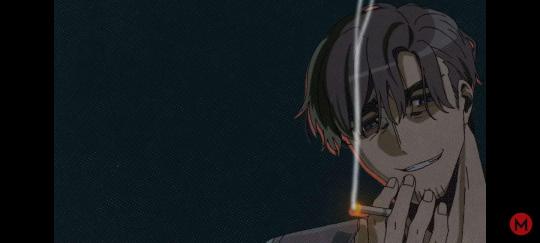
showing hinako and us, the audience, a very unique expression where he's snide, mischievous... almost mocking, yet at the same time, really depressed and frustrated with it all. from hinako's pose in half touching kazui's "true side", this is his answer; she is not going to like it one bit.

a stark difference in feelings. kazui looks like he's going to say or do something harmful, but his other side tells us otherwise. he didn't want things to be like this. also, it contrasts with the final scene in half very well.

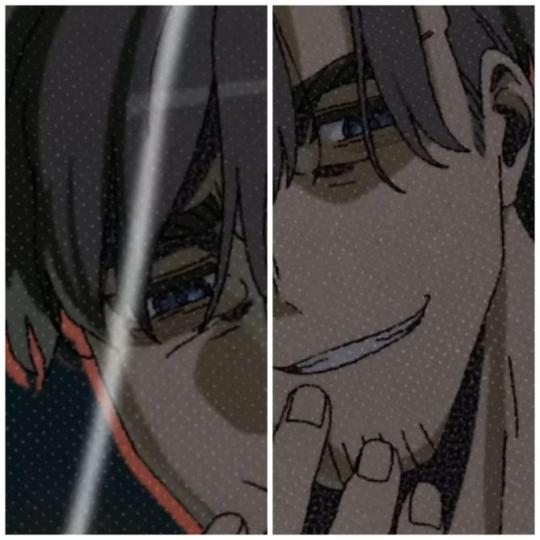
when he bites on the dove, he doesn't look that satisfied doing so.
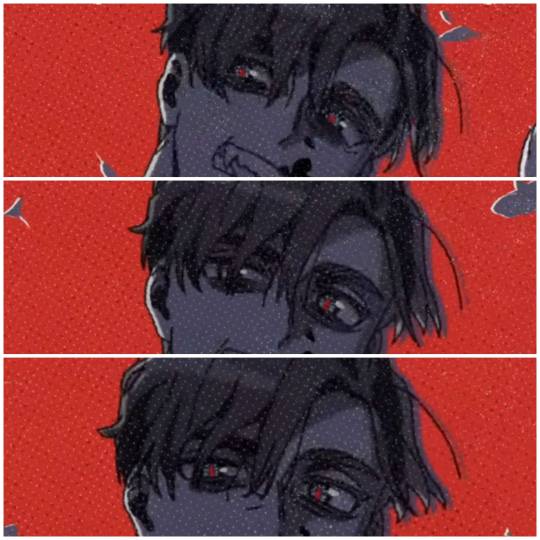

in this climax, it seems like kazui himself doesn't know what's what anymore, letting the adrenaline of telling his feelings take over him. letting both his "true" feelings and his "lying" self beat him up, because at this point of no return, what difference will his fake and real self make anyway?
i really love how we can't tell if his bloodied lips are frowning because he's shocked, distressed, or if he's grinning ear to ear, happy and glad to have finally told the truth. even in this scene you can tell that the right side of his lips is less happy than his left where his mouth is more elevated and smiling.
what does he feel now after all of this chaos? well, let's look back at his right side of his face again...
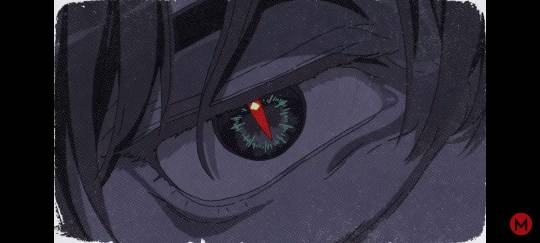
the MV ends with this shot of his right eye, slowly zooming in.
empty, emotionless, forlorn, and distant...
it's almost like he's staring and watching something at the sky after something fell down.
#kazui mukuhara#yuugram log#ahghhha aughh im really proud of this post i hope it sounds coherent lol#milgram theories#milgram analysis#milgram theory#mukuhara kazui#cw sui mention#it is 5 am
150 notes
·
View notes
Text
to see a milgram character as a "good person" or "bad person" is a failure of media literacy for milgram. the entire lesson of the milgram project is that thinking in such black and whites, to deem someone as "good - innocent/forgiven" and "bad - guilty/guilty" only causes damage. the prisoners voted forgiven are not helped. the prisoners voted guilty aren't either. the lesson is that such a mindset will never help you- that it will harm whatever youre touching with it.
we cannot stop this, either- we have to keep choosing one or the other, because an abstained vote is impossible. we just have to keep choosing to shock them, over and over, no matter how much they beg us to stop because there is no other choice. you as an individual can refuse to vote, but someone else will always choose to. it is better to put in a vote, in that scenario, than to have it be uncounted entirely.
stop shoving characters in such black and white boxes. this is a story about nuance. they are not only "good", they are not only "bad". acknowledge that they are both. acknowledge that these characters are deeper than that. this is, quite literally, the "look deeper" media, you're supposed to be analysing. you're supposed to be theorising and looking at evidence under a microscope.
you're supposed to be acknowledging nuance, because anything could be true and anything could be incorrect. even a theory you prize could be completely wrong, or a theory you hate could be completely right. theorising about a character is not to "excuse" their actions or make them more "sympathetic", but rather to explain their actions. to flesh them out.
plus, as a bit of rant, you've all gotta stop dismissing people's theories completely just because you believe your own is oh-so above it. acknowledge a theory's evidence, acknowledge a theory's points, acknowledge why it could and could not be true. don't become obsessed with the black and white "I Choose To Only See The Worst Of This Character And Nothing Else Because That's My Preference!!! I'm Just Critical!!!" or "I Choose To Only See The Good Of This Character And Nothing Else Because That's My Preference!!! I'm A Moral Paragon!!!". jesus fucking christ.
i sincerely hope this doesnt make you believe that i think im above this same mindset either- i'm very much not. i can be guilty of it as well. but the important thing about analysing media is the ability to acknowledge every possibility, every point of view, anything that's possible. to discard any bias you may have in order to figure out what's going on in a clear and succinct manner that is closest to the truth. please remember this!
#interestingly most if not all of the prisoners also seem to have a very black and white belief of “good” and “bad” people as well#a bit of rant but i hope my point gets across! i fear i mightve gotten a bit off topic#milgram#haruka sakurai#yuno kashiki#fuuta kajiyama#muu kusunoki#shidou kirisaki#mahiru shiina#kazui mukuhara#amane momose#mikoto kayano#kotoko yuzuriha#milgram analysis#i hope. this reaches the people i intended to. but this post is also kind of swinging a baseball bat at everyone/a lot of posting i see#(not exclusive to tumblr)
260 notes
·
View notes
Text
Okay y’all, you gotta hear me out on this one. I know it’s 5:27AM but… I have a theory.
We see the girl from Harrow right? We see her hanging out with Kotoko and there’s this friendly and casual banter (Kotoko putting her hat on and ruffling it). Again, later we see the same girl who rushes over to greet Kotoko happily like she usually would, but then is shocked/terrified. Kotoko is in for the kill.
My theory? The young girl follows Kotoko around, and this ends up leading to her kidnapping, causing Kotoko to feel immense guilt over what happened when she should have protected her.
Thank you for listening, I will go to sleep now.
#milgram#milgram project#ミルグラム#yuzuriha kotoko#kotoko yuzuriha#milgram kotoko#milgram theory#faceless es rambles#faceless es theory#milgram analysis#i should add more to this later
93 notes
·
View notes
Text
"If you kill a killer, the number of killers in the world stays the same"
Then I'll kill as many as I can
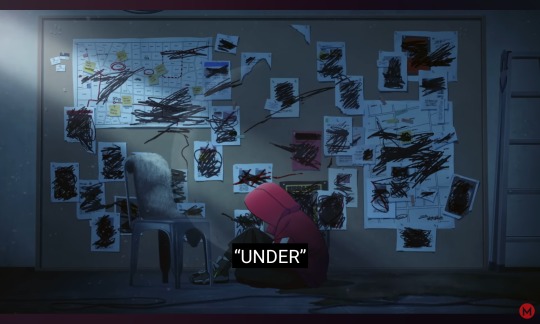
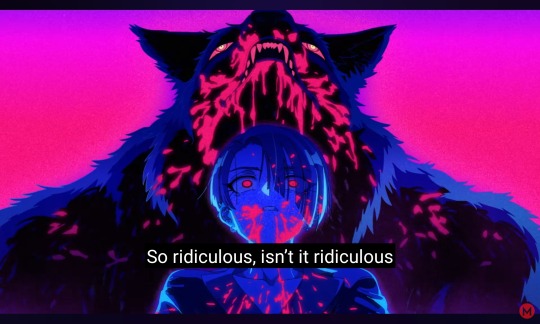
She already knows she's getting guilty. Her words on yonah might say one thing, but her heart and her mind know that she is now one of those murderers... she is no longer "clean of sin"
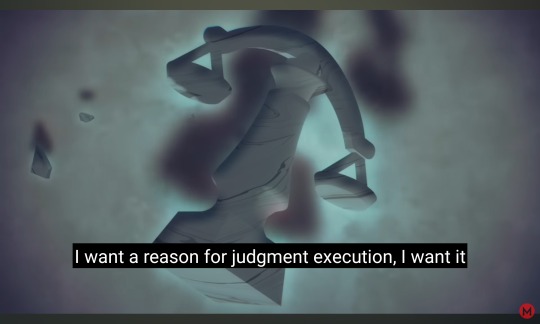
She is now stained, and one of those sinners she hates so much.
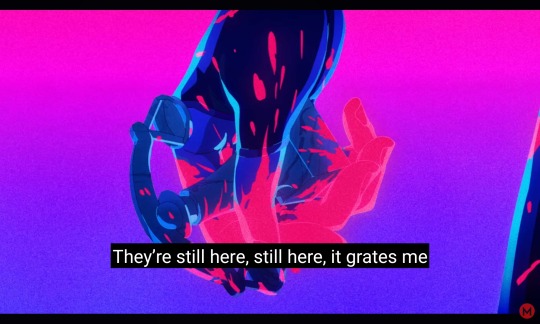
And she can barely deal with the guilt, that's why she continues to bottle it up, to eat so she doesn't burn out, because if she stops now... then what was it all for?
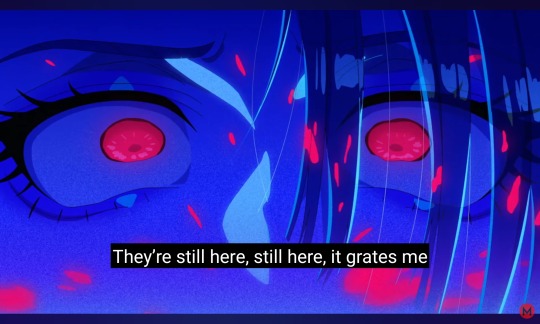
If I forgive her or not it doesn't matter, because she doesn't forgive herself
#i feel so sad for her....#i have so many feelings and thoughts i love this#i need to surf the tag now WOWOWOWOWO#WIFE IS GORGEOUS I LOVE HER- sorry you probably expected commentary look I'm gay#kotoko yuzuriha#milgram#wife <3#milgram analysis
69 notes
·
View notes
Text
I was thinking about 01-08 parallels, and thought about this:
Amane, a child who wants to be treated like an adult.
Haruka, a teenager/young adult who wants to be treated like a child.
Both of them went throught heavy child abuse - Haruka was neglected, ignored and verbally abused if not more, and Amane was a victim of ritual abuse, and we've already seen a lot of what she suffered.
The key difference in their responses to trauma and abuse from their caregivers is how they perceive themselves, and growing up.
Amane, inside the cult, sees the adults around her as people with power. People that are respected, and never understimated. She wants to be like them, she imitates her, but her naive and obvious childish mentality comes to light when you realize she's just repeating the things the adults around her lectured her to say, and that she's (accordingly) very childish. She wants to grow up because it would mean people will finally take her seriously.
However, for Haruka's case, growing up is a signal of losing everything that made him happy once. When he started to grow up, he realized he couldn't keep with everything people around his age were supposed to do, and sooner than later he lost the love of his own mother. He wants to stay like that because that's the only source of comfort he's ever had and he's been deprived of it for so long he'd do *anything* to feel it again.


We also have the visual parallels!! Both are drowning, but while amane is still trying to swim up, Haruka falls like he just gave up.
They were both, in their own ways, drowning in the expectations others had over them. The pressure they felt to meet what everyone wanted from them, and the suffering that came when they couldn't.
#ill work on an amane analysis soon#hopefully it will be good#but honestly i don't have any strong theories like i did with kazui#i just have feelings and want to discuss imagery#i really got shaked by this mv#it hit me like a truck#milgram#haruka sakurai#amane momose#milgram analysis
209 notes
·
View notes
Text
Milgram and The Court of Public Opinion.
this analysis will be about milgram's voting system, nuance and a whole lot of my own opinions mixed with eng fandoms translations, theories, and observations.
t1 = trial one / t2 = trial two
mv = music video
vd = video drama
voting and verdicts:
voting forgiven/unforgiven or innocent/guilty from the standards milgram sets for us (including es) isn't enough or easy.
being that milgram is set towards the court of public opinion and judgement can come from:
"sensibility, morality, ethics, legality, preference, taste, or sexual inclination..."
we end up arguing semantics, trying to find specifics in the crimes and making the best judgement possible. although in doing that the only conclusion anyone can come to is innocent when all is considered.
if we were doing it based on guilty and innocent then 5 are guilty, 2 are guilty on technicality and 3 are innocent
just in case you're curious, in guilty to innocent order as i just stated.
haruka, muu, amane, mikoto, kotoko, shido, fuuta, kazui, mahiru and yuno
it'd be over so quickly. but this... is milgram.
nuance/the grey area:
as the undercover song says, can you really judge them?
002. yuno, as for now, doesn't have a reason. ofc in western (american specifically) public opinion or at least those who view abortion as a choice. she's been innocent from the start. this is her autonomy, her choice, even if she's 18. i won't deny she is so young to be doing sex work, or more specifically compensated dating, and yes it may be common in japan but that doesn't take away the age being factored into what she decided to do. it wasn't for money and she has a good home life. with how analytical and cold she can be, im assuming her desire to be loved in this way comes from somewhere and she's become jaded towards actual relationships. opting for the material and superficial. even without pitying her, she'd still be forgiven/innocent since t1.
001. haruka did it for attention. with how he's coded - intellectual disability - and his mother being extremely neglectful after a certain age which prevented the possibility of his growth in intellect (understanding cause and effect/actions and consequences, along with many other things) it's easier to claim he's innocent. even more easier to forgive him due to this and extremely so if looking at it from his view point, albeit flawed. killing = attention = "affection", even if that attention/"affection" is negative it what he wanted. for someone, anyone to acknowledge him. he's innocent/forgiven because of his circumstances but if he's forgiven then he's being told it was his only option, and he was right, when the fault is on his mother.
003. fuuta was only trying to call out liars and scumbags. he is well versed in the court of public opinion, but he has never seen or experienced a result that lead to someone's death. looking at the undercover mv, then we can see he possibly doxxed his victim. if we take a nuanced approach here then we'd be looking at how he feels after the fact. he remembers the victims name, the fear in his eyes in his t1 and t2 mv, his voice drama after the first trial, him not approving of violence as a solution are all evidence of him feeling horrible. if he could go back, if he would've known. sure he did question why he's there instead of the people who actually killed the victim, but he also recognizes that he lead the charge. his innocence/forgiveness comes in the form of recognizing his actions were wrong. him being guilty/unforgiven is the action in itself.
004. muu is a love/attention reason. she's always been adored, admired, and cherished. she's always had her way. she also has never had to face heavy adversity. sure she was a bully, the queen bee, and a drama queen but didn't her school's culture allow her that? infact with us/es forgiving her, in the second trial song she claims as such, she'll always be queen. and for the t1 mv she says, "my 'im sorry' spells aren't working anymore." which leads me to believe that she's cried and apologized so many times that her old friends couldn't believe her. not forgiving her affirms to her that "two wrongs don't make a right" but forgiving her says the opposite to her. if she's to be forgiven/innocent the blame is tossed to the school, not her, but she won't see it that way.
006. mahiru is another love case, romantic, and in a roundabout way she never committed a crime in the first place. from the voice drama and interrogation q&a slips, we find out that she's a sheltered girl and loves/idolizes soap opera and shoujo mangas. from her mv's we see she romanticizes everything, especially with her t1 mv. she's innocent because of not actually committing murder and forgiven because this is her first love, she wouldn't have known that it was toxic and messed up.
005. shido is a love case, but for family. im thinking son because of a theory i saw, but either way when looking at it with nuance it gets heavier here. is taking from brain dead patients to save someone wrong? are the brain dead really dead? in my opinion yes, but that's the crux of the situation right? same goes for all the other inmates in this court of public opinion. he can be innocent from the view point that brain dead patients are already dead, and forgiven for his motive.
007. kazui did it in hopes of a dream, righting a mistake, being free. although he deeply regrets it, although he says he loves his wife? that love is mainly platonic. from his second trial mv, we see that he met her through his job - most likely police officer - so they had some kind of amicable relationship through their job. he only married her out of societal obligation, and noticing she liked him. not to mention in his t1 mv he says he messed up from the beginning. he is innocent because his crime is indirect, and forgiven because being gay isn't a crime and the regret he feels shows he never had negative intentions.
008. amane did it out of obligation. now, listen to me. i know she's literally 12 and was raised in a cult but notice how im stating the motive of each of these as they are from being stated in vd or pure observations from the mv's. now to any grown up it's self defense, but also imagine having gone through the worst hell imaginable all because you did something "wrong" stated by the adults around you. wouldn't the revenge be sweet? justice in its purest form. now take that and double it down with what you were taught. amane is not only forgiven/innocent because she was just a child, but because of the circumstances surrounding the murder.
009. mikoto (miko from here on) did it out of pent up stress an emotions, in turn creating john (koto from here on). miko is innocent without a doubt, and no i am not taking on the theory he actually did it til we get trial three. if koto was supposed to be his protector, and if he was born from a sudden explosion of pent up anger then (at least to me) it makes sense that he reacted the way he did. imagine being a corporate slave - no actually double it down, again, with growing up always trying to keep the peace. miko has a habit of laughing when he's upset. he laughs it off in hopes that things get better, his vd affirms this and even his mv after that. miko's smile that shifts to an extremely tired expression right before koto is born and a mirror shatters, right at the start. an intolerable stress from working so hard he grew grey hairs, cried himself to sleep, and yet continued to work, hold it in, and endure. the fault isn't on him or on koto. it's japan's work culture and the endure it mentality. koto is innocent/forgiven in the sense of motive. miko is innocent/forgiven because he's never killed to begin with.
010. kotoko did it to save the innocent. though she doesn't deal in nuance, much like fuuta. a key difference between the two is kotoko chooses violence because the justice system failed her. infact she's been hunting down the awful criminals of the world so much that she even has a covered bulletin board with pinned strings on it. on top of that, from the interrogation cards, we find out she dropped out of college and she was studying law. she'd be innocent for what she was seeking to do, in the court of public opinion, many would agree that awful people deserve a murderous punishment and she'd be even forgiven with that same reason. the nuance appears when considering the criminal, the crime and the reason. factoring those in then she can easily become guilty and unforgiven in the eyes of many, see the results after t1.
when it's all said and done:
they all had their reason, it all has a reason. who are we to say their crimes weren't just or fair? we're the judge, the jury, the executioner, and warden. in milgram whatever we says goes.
i'd love to see them all innocent, but at the same time do each of them deserve that? are their ideas being affirmed a detriment to them or their saving grace?? will they kill again?? will some of them be able to get the therapy and treatment they desperately need??? will they go back into society with an improved outlook on life or will they remain the same?
ofc i already have who i'd like to see forgiven and have already forgiven them myself, same as you reading this and those in the jp fandom (where it originates)
anyway. moving forward please vote with this in mind, and check out the audio dramas i beg you all. i hope that there are nuance voters and voters with sympathy but with how amane was guilty in t1, i have a strong feeling it's not gonna end well. but if it does, you'll see me rejoice.
#milgram project#milgram analysis#milgram#haruka sakurai#yuno kashiki#fuuta kajiyama#muu kusunoki#shidou kirisaki#mahiru shiina#kazui mukuhara#amane momose#mikoto kayano#kotoko yuzuriha
41 notes
·
View notes